Counselling Relationship Centred Counselling Termination Process
VerifiedAdded on 2023/06/09
|40
|5647
|435
AI Summary
This workbook focuses on the termination process in counselling and how to manage the transition to termination while meeting the needs of the client. It includes personal reflections, understanding the termination process, and client reactions to termination. The workbook aims to provide a confident knowledge on termination process for trainee counsellors.
Contribute Materials
Your contribution can guide someone’s learning journey. Share your
documents today.

Unit Title: Counselling; Relationship Centred Counselling Skills: Stage 3 of the 3
stage integrative model
stage integrative model
Secure Best Marks with AI Grader
Need help grading? Try our AI Grader for instant feedback on your assignments.

SKILLS 3
Student Learning Journal Workbook
PART 5
TERMINATION
Student Name: -----------------------------------------------------
Start Date: -----------------------------------------------------
Submission Date: -----------------------------------------------------
Student Learning Journal Workbook
PART 5
TERMINATION
Student Name: -----------------------------------------------------
Start Date: -----------------------------------------------------
Submission Date: -----------------------------------------------------
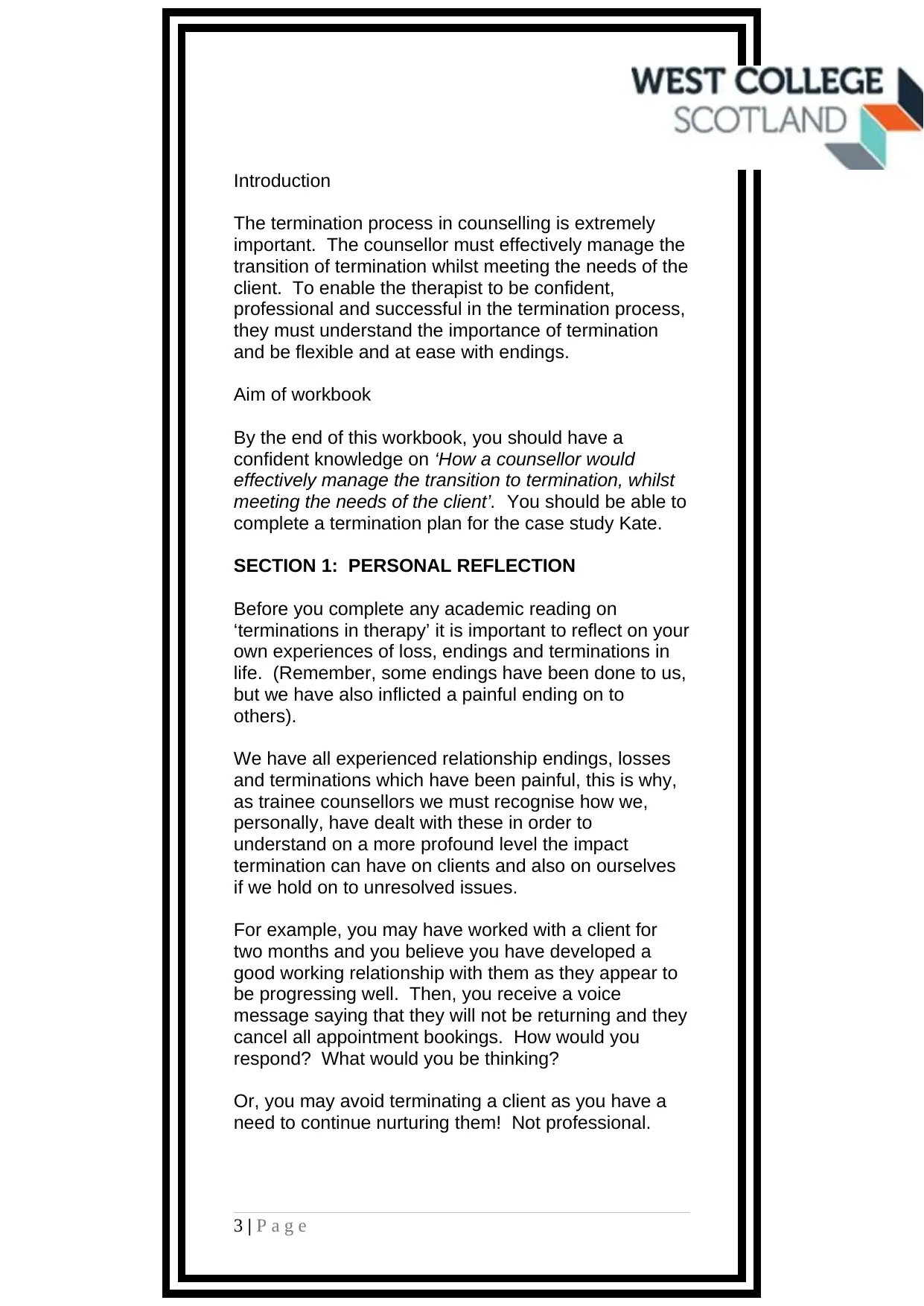
Introduction
The termination process in counselling is extremely
important. The counsellor must effectively manage the
transition of termination whilst meeting the needs of the
client. To enable the therapist to be confident,
professional and successful in the termination process,
they must understand the importance of termination
and be flexible and at ease with endings.
Aim of workbook
By the end of this workbook, you should have a
confident knowledge on ‘How a counsellor would
effectively manage the transition to termination, whilst
meeting the needs of the client’. You should be able to
complete a termination plan for the case study Kate.
SECTION 1: PERSONAL REFLECTION
Before you complete any academic reading on
‘terminations in therapy’ it is important to reflect on your
own experiences of loss, endings and terminations in
life. (Remember, some endings have been done to us,
but we have also inflicted a painful ending on to
others).
We have all experienced relationship endings, losses
and terminations which have been painful, this is why,
as trainee counsellors we must recognise how we,
personally, have dealt with these in order to
understand on a more profound level the impact
termination can have on clients and also on ourselves
if we hold on to unresolved issues.
For example, you may have worked with a client for
two months and you believe you have developed a
good working relationship with them as they appear to
be progressing well. Then, you receive a voice
message saying that they will not be returning and they
cancel all appointment bookings. How would you
respond? What would you be thinking?
Or, you may avoid terminating a client as you have a
need to continue nurturing them! Not professional.
3 | P a g e
The termination process in counselling is extremely
important. The counsellor must effectively manage the
transition of termination whilst meeting the needs of the
client. To enable the therapist to be confident,
professional and successful in the termination process,
they must understand the importance of termination
and be flexible and at ease with endings.
Aim of workbook
By the end of this workbook, you should have a
confident knowledge on ‘How a counsellor would
effectively manage the transition to termination, whilst
meeting the needs of the client’. You should be able to
complete a termination plan for the case study Kate.
SECTION 1: PERSONAL REFLECTION
Before you complete any academic reading on
‘terminations in therapy’ it is important to reflect on your
own experiences of loss, endings and terminations in
life. (Remember, some endings have been done to us,
but we have also inflicted a painful ending on to
others).
We have all experienced relationship endings, losses
and terminations which have been painful, this is why,
as trainee counsellors we must recognise how we,
personally, have dealt with these in order to
understand on a more profound level the impact
termination can have on clients and also on ourselves
if we hold on to unresolved issues.
For example, you may have worked with a client for
two months and you believe you have developed a
good working relationship with them as they appear to
be progressing well. Then, you receive a voice
message saying that they will not be returning and they
cancel all appointment bookings. How would you
respond? What would you be thinking?
Or, you may avoid terminating a client as you have a
need to continue nurturing them! Not professional.
3 | P a g e

Student Exercise 1:
Please read the
following article
‘Beginnings and
Endings in Therapy
and Life: Two sides
of a Coin’ by Libby
Webber, and answer
the questions set
below.
https://
counsellingresource.c
om/features/
2010/09/29/
beginnings-and-
endings-in-therapy-
and-in-life/
1. With reference to
the article, explain
what beginnings and
endings have in
common.
Type your response
here: child suffering
from mental trauma
evoke robust
emotions like
depression, anxiety,
sadness, excitement,
rejection,
expectation, fear,
loss and anger.
Beginning and ending
what has
4 | P a g e
Please read the
following article
‘Beginnings and
Endings in Therapy
and Life: Two sides
of a Coin’ by Libby
Webber, and answer
the questions set
below.
https://
counsellingresource.c
om/features/
2010/09/29/
beginnings-and-
endings-in-therapy-
and-in-life/
1. With reference to
the article, explain
what beginnings and
endings have in
common.
Type your response
here: child suffering
from mental trauma
evoke robust
emotions like
depression, anxiety,
sadness, excitement,
rejection,
expectation, fear,
loss and anger.
Beginning and ending
what has
4 | P a g e
Secure Best Marks with AI Grader
Need help grading? Try our AI Grader for instant feedback on your assignments.
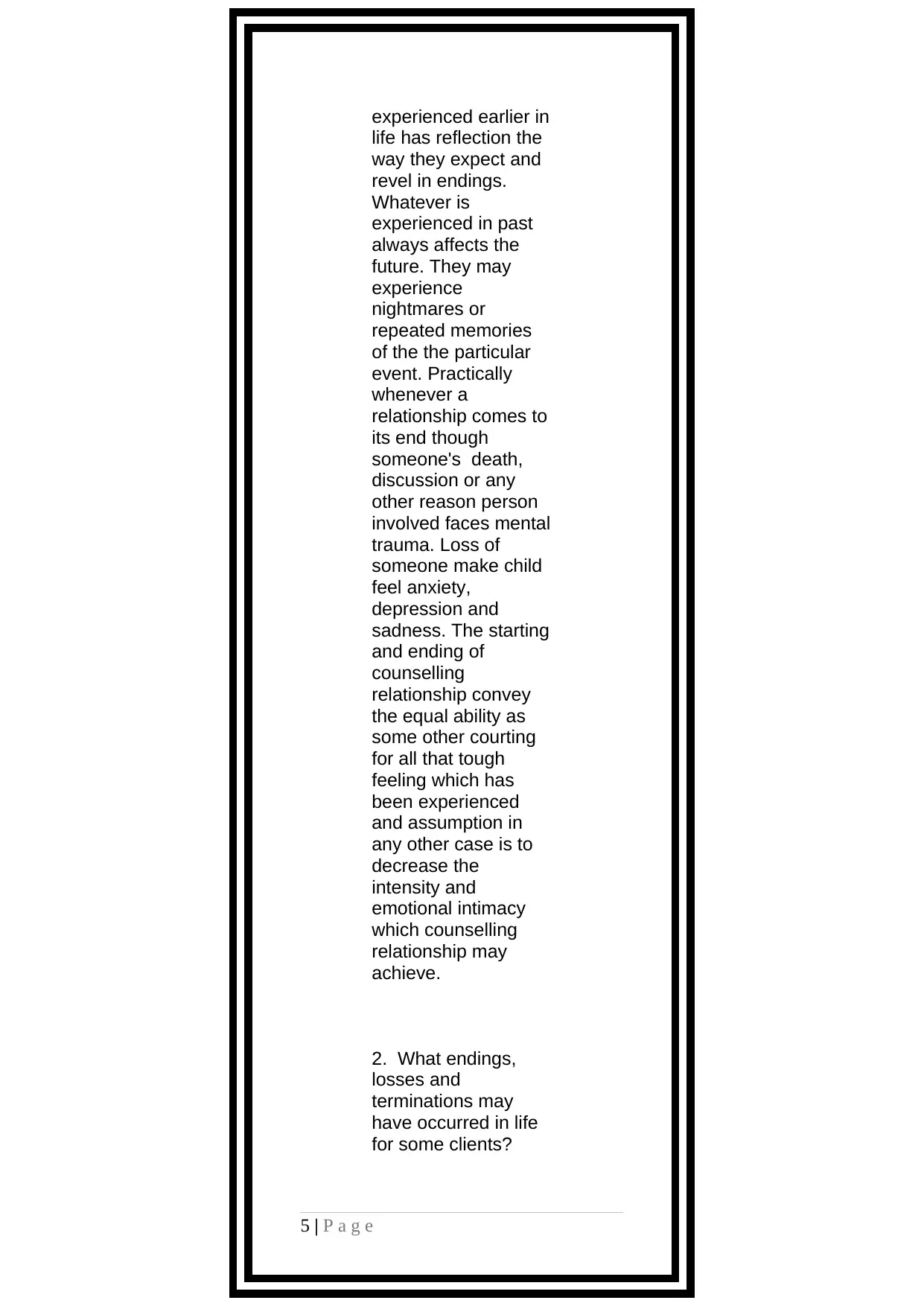
experienced earlier in
life has reflection the
way they expect and
revel in endings.
Whatever is
experienced in past
always affects the
future. They may
experience
nightmares or
repeated memories
of the the particular
event. Practically
whenever a
relationship comes to
its end though
someone's death,
discussion or any
other reason person
involved faces mental
trauma. Loss of
someone make child
feel anxiety,
depression and
sadness. The starting
and ending of
counselling
relationship convey
the equal ability as
some other courting
for all that tough
feeling which has
been experienced
and assumption in
any other case is to
decrease the
intensity and
emotional intimacy
which counselling
relationship may
achieve.
2. What endings,
losses and
terminations may
have occurred in life
for some clients?
5 | P a g e
life has reflection the
way they expect and
revel in endings.
Whatever is
experienced in past
always affects the
future. They may
experience
nightmares or
repeated memories
of the the particular
event. Practically
whenever a
relationship comes to
its end though
someone's death,
discussion or any
other reason person
involved faces mental
trauma. Loss of
someone make child
feel anxiety,
depression and
sadness. The starting
and ending of
counselling
relationship convey
the equal ability as
some other courting
for all that tough
feeling which has
been experienced
and assumption in
any other case is to
decrease the
intensity and
emotional intimacy
which counselling
relationship may
achieve.
2. What endings,
losses and
terminations may
have occurred in life
for some clients?
5 | P a g e
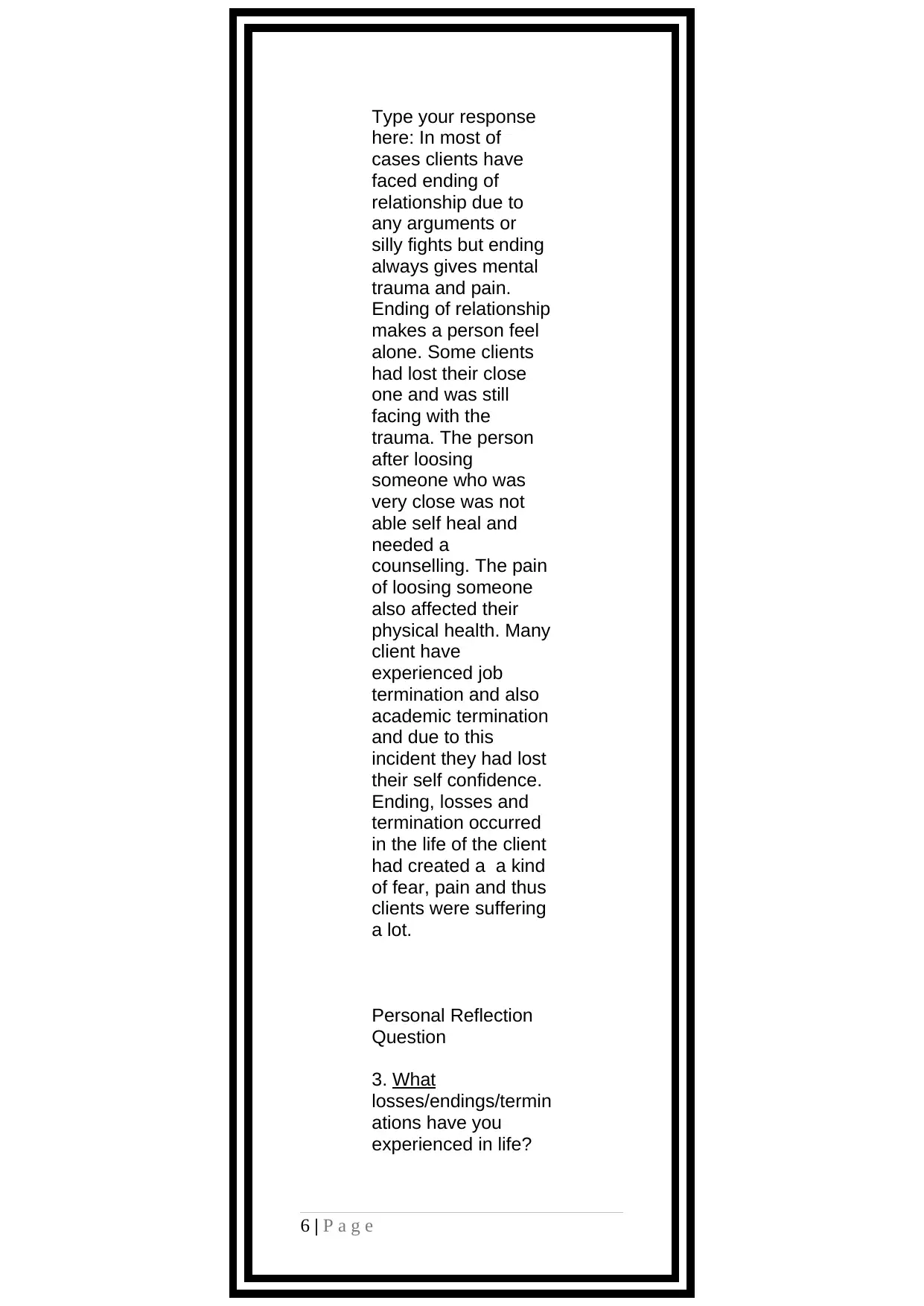
Type your response
here: In most of
cases clients have
faced ending of
relationship due to
any arguments or
silly fights but ending
always gives mental
trauma and pain.
Ending of relationship
makes a person feel
alone. Some clients
had lost their close
one and was still
facing with the
trauma. The person
after loosing
someone who was
very close was not
able self heal and
needed a
counselling. The pain
of loosing someone
also affected their
physical health. Many
client have
experienced job
termination and also
academic termination
and due to this
incident they had lost
their self confidence.
Ending, losses and
termination occurred
in the life of the client
had created a a kind
of fear, pain and thus
clients were suffering
a lot.
Personal Reflection
Question
3. What
losses/endings/termin
ations have you
experienced in life?
6 | P a g e
here: In most of
cases clients have
faced ending of
relationship due to
any arguments or
silly fights but ending
always gives mental
trauma and pain.
Ending of relationship
makes a person feel
alone. Some clients
had lost their close
one and was still
facing with the
trauma. The person
after loosing
someone who was
very close was not
able self heal and
needed a
counselling. The pain
of loosing someone
also affected their
physical health. Many
client have
experienced job
termination and also
academic termination
and due to this
incident they had lost
their self confidence.
Ending, losses and
termination occurred
in the life of the client
had created a a kind
of fear, pain and thus
clients were suffering
a lot.
Personal Reflection
Question
3. What
losses/endings/termin
ations have you
experienced in life?
6 | P a g e
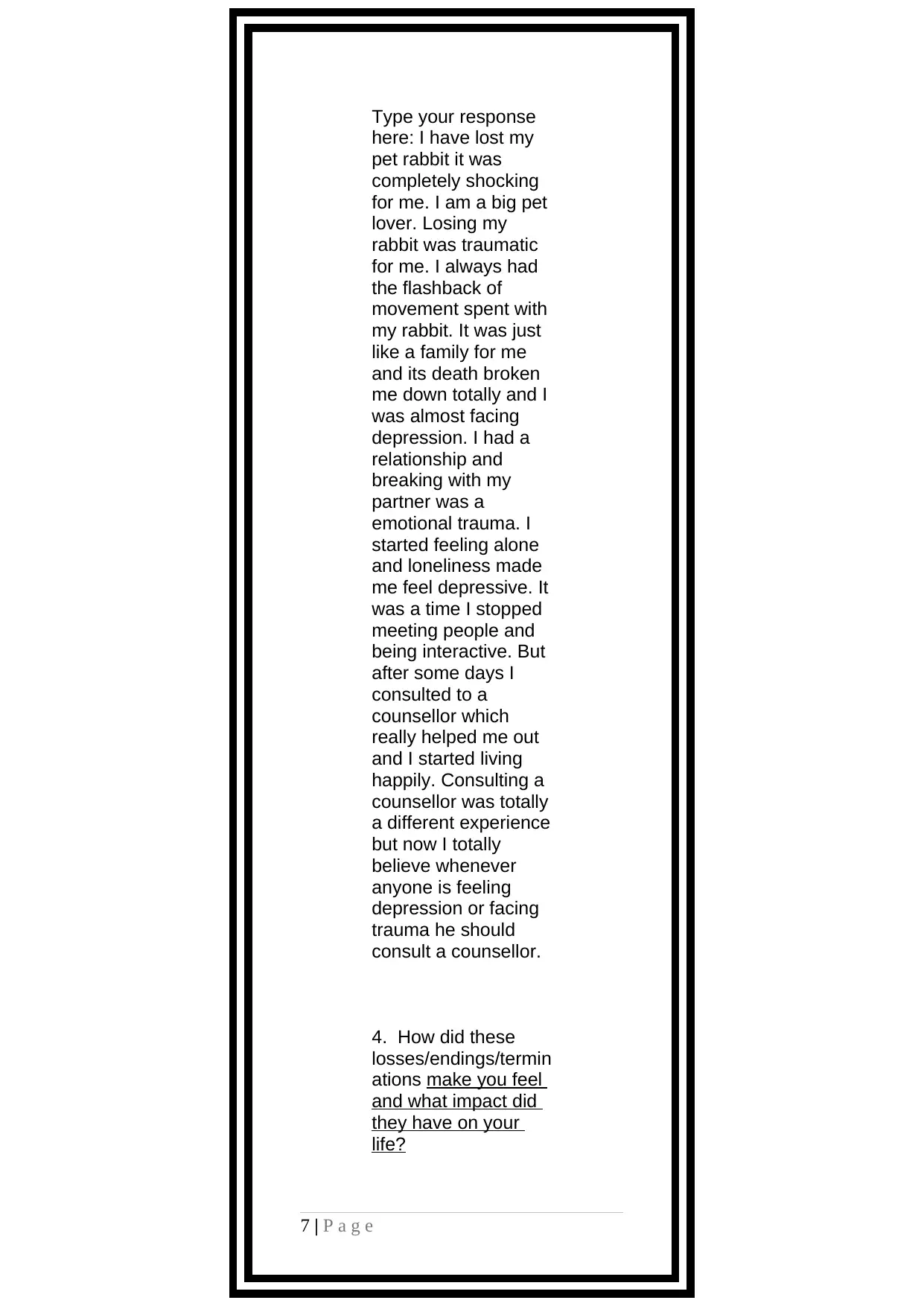
Type your response
here: I have lost my
pet rabbit it was
completely shocking
for me. I am a big pet
lover. Losing my
rabbit was traumatic
for me. I always had
the flashback of
movement spent with
my rabbit. It was just
like a family for me
and its death broken
me down totally and I
was almost facing
depression. I had a
relationship and
breaking with my
partner was a
emotional trauma. I
started feeling alone
and loneliness made
me feel depressive. It
was a time I stopped
meeting people and
being interactive. But
after some days I
consulted to a
counsellor which
really helped me out
and I started living
happily. Consulting a
counsellor was totally
a different experience
but now I totally
believe whenever
anyone is feeling
depression or facing
trauma he should
consult a counsellor.
4. How did these
losses/endings/termin
ations make you feel
and what impact did
they have on your
life?
7 | P a g e
here: I have lost my
pet rabbit it was
completely shocking
for me. I am a big pet
lover. Losing my
rabbit was traumatic
for me. I always had
the flashback of
movement spent with
my rabbit. It was just
like a family for me
and its death broken
me down totally and I
was almost facing
depression. I had a
relationship and
breaking with my
partner was a
emotional trauma. I
started feeling alone
and loneliness made
me feel depressive. It
was a time I stopped
meeting people and
being interactive. But
after some days I
consulted to a
counsellor which
really helped me out
and I started living
happily. Consulting a
counsellor was totally
a different experience
but now I totally
believe whenever
anyone is feeling
depression or facing
trauma he should
consult a counsellor.
4. How did these
losses/endings/termin
ations make you feel
and what impact did
they have on your
life?
7 | P a g e
Paraphrase This Document
Need a fresh take? Get an instant paraphrase of this document with our AI Paraphraser
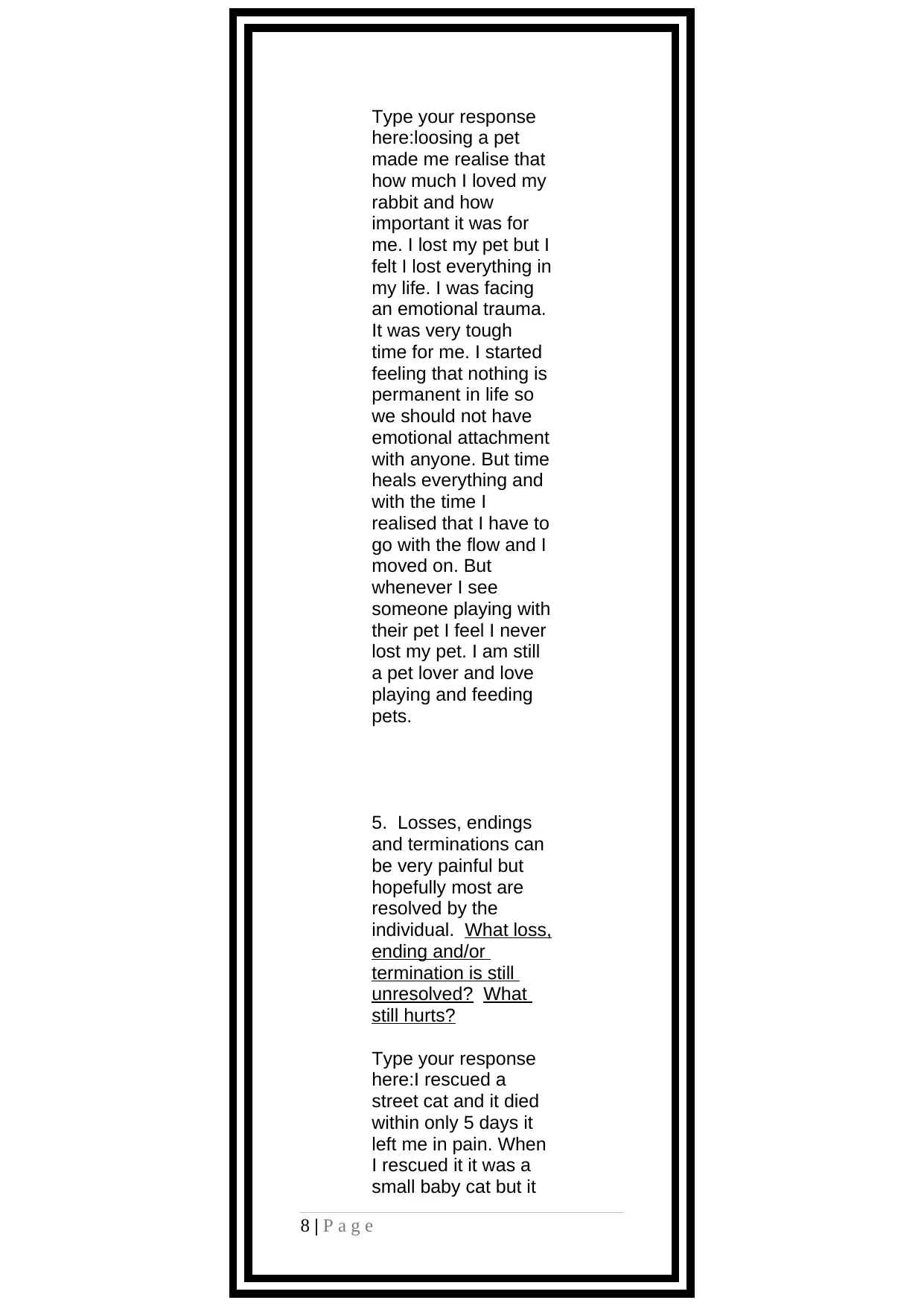
Type your response
here:loosing a pet
made me realise that
how much I loved my
rabbit and how
important it was for
me. I lost my pet but I
felt I lost everything in
my life. I was facing
an emotional trauma.
It was very tough
time for me. I started
feeling that nothing is
permanent in life so
we should not have
emotional attachment
with anyone. But time
heals everything and
with the time I
realised that I have to
go with the flow and I
moved on. But
whenever I see
someone playing with
their pet I feel I never
lost my pet. I am still
a pet lover and love
playing and feeding
pets.
5. Losses, endings
and terminations can
be very painful but
hopefully most are
resolved by the
individual. What loss,
ending and/or
termination is still
unresolved? What
still hurts?
Type your response
here:I rescued a
street cat and it died
within only 5 days it
left me in pain. When
I rescued it it was a
small baby cat but it
8 | P a g e
here:loosing a pet
made me realise that
how much I loved my
rabbit and how
important it was for
me. I lost my pet but I
felt I lost everything in
my life. I was facing
an emotional trauma.
It was very tough
time for me. I started
feeling that nothing is
permanent in life so
we should not have
emotional attachment
with anyone. But time
heals everything and
with the time I
realised that I have to
go with the flow and I
moved on. But
whenever I see
someone playing with
their pet I feel I never
lost my pet. I am still
a pet lover and love
playing and feeding
pets.
5. Losses, endings
and terminations can
be very painful but
hopefully most are
resolved by the
individual. What loss,
ending and/or
termination is still
unresolved? What
still hurts?
Type your response
here:I rescued a
street cat and it died
within only 5 days it
left me in pain. When
I rescued it it was a
small baby cat but it
8 | P a g e
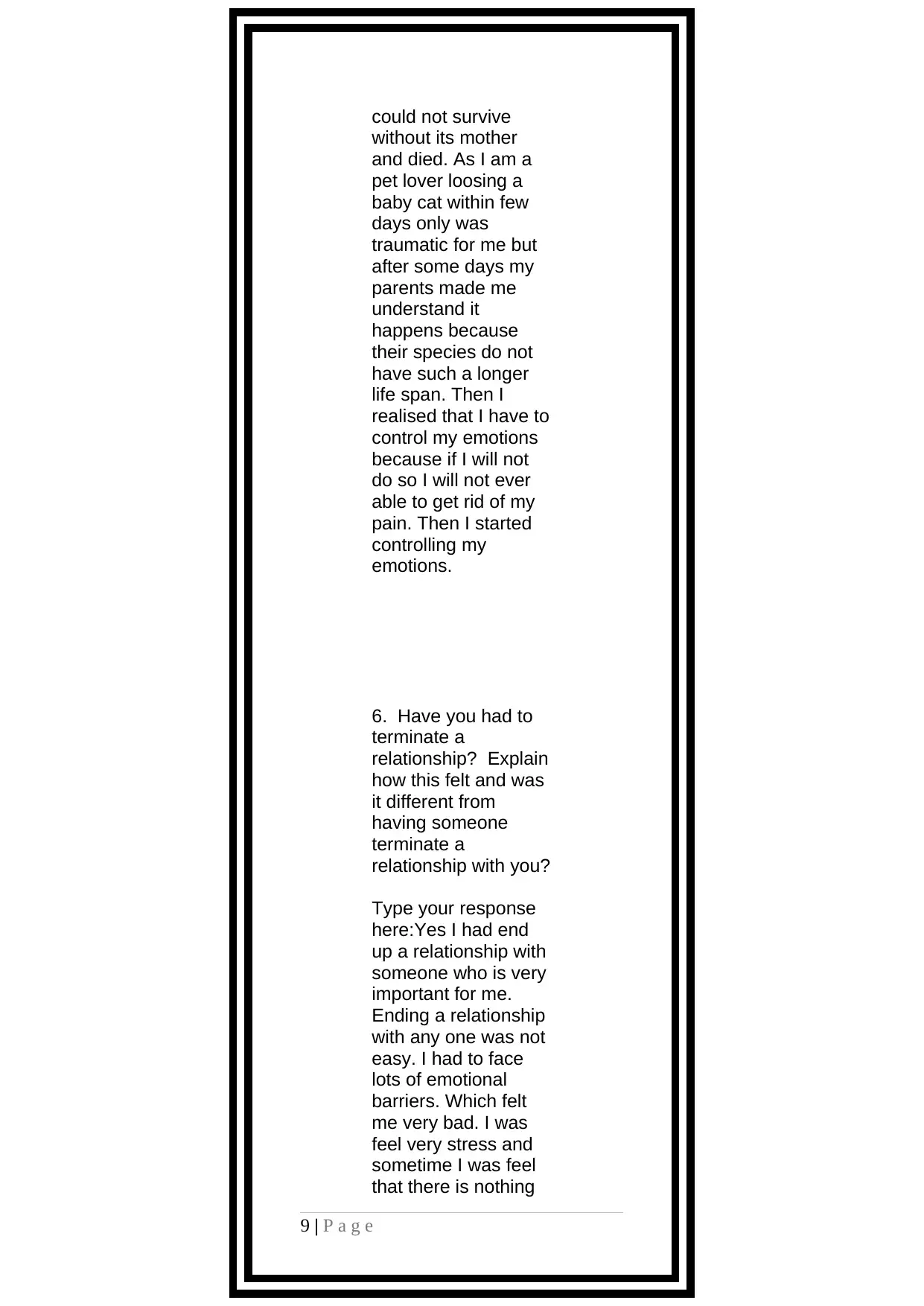
could not survive
without its mother
and died. As I am a
pet lover loosing a
baby cat within few
days only was
traumatic for me but
after some days my
parents made me
understand it
happens because
their species do not
have such a longer
life span. Then I
realised that I have to
control my emotions
because if I will not
do so I will not ever
able to get rid of my
pain. Then I started
controlling my
emotions.
6. Have you had to
terminate a
relationship? Explain
how this felt and was
it different from
having someone
terminate a
relationship with you?
Type your response
here:Yes I had end
up a relationship with
someone who is very
important for me.
Ending a relationship
with any one was not
easy. I had to face
lots of emotional
barriers. Which felt
me very bad. I was
feel very stress and
sometime I was feel
that there is nothing
9 | P a g e
without its mother
and died. As I am a
pet lover loosing a
baby cat within few
days only was
traumatic for me but
after some days my
parents made me
understand it
happens because
their species do not
have such a longer
life span. Then I
realised that I have to
control my emotions
because if I will not
do so I will not ever
able to get rid of my
pain. Then I started
controlling my
emotions.
6. Have you had to
terminate a
relationship? Explain
how this felt and was
it different from
having someone
terminate a
relationship with you?
Type your response
here:Yes I had end
up a relationship with
someone who is very
important for me.
Ending a relationship
with any one was not
easy. I had to face
lots of emotional
barriers. Which felt
me very bad. I was
feel very stress and
sometime I was feel
that there is nothing
9 | P a g e
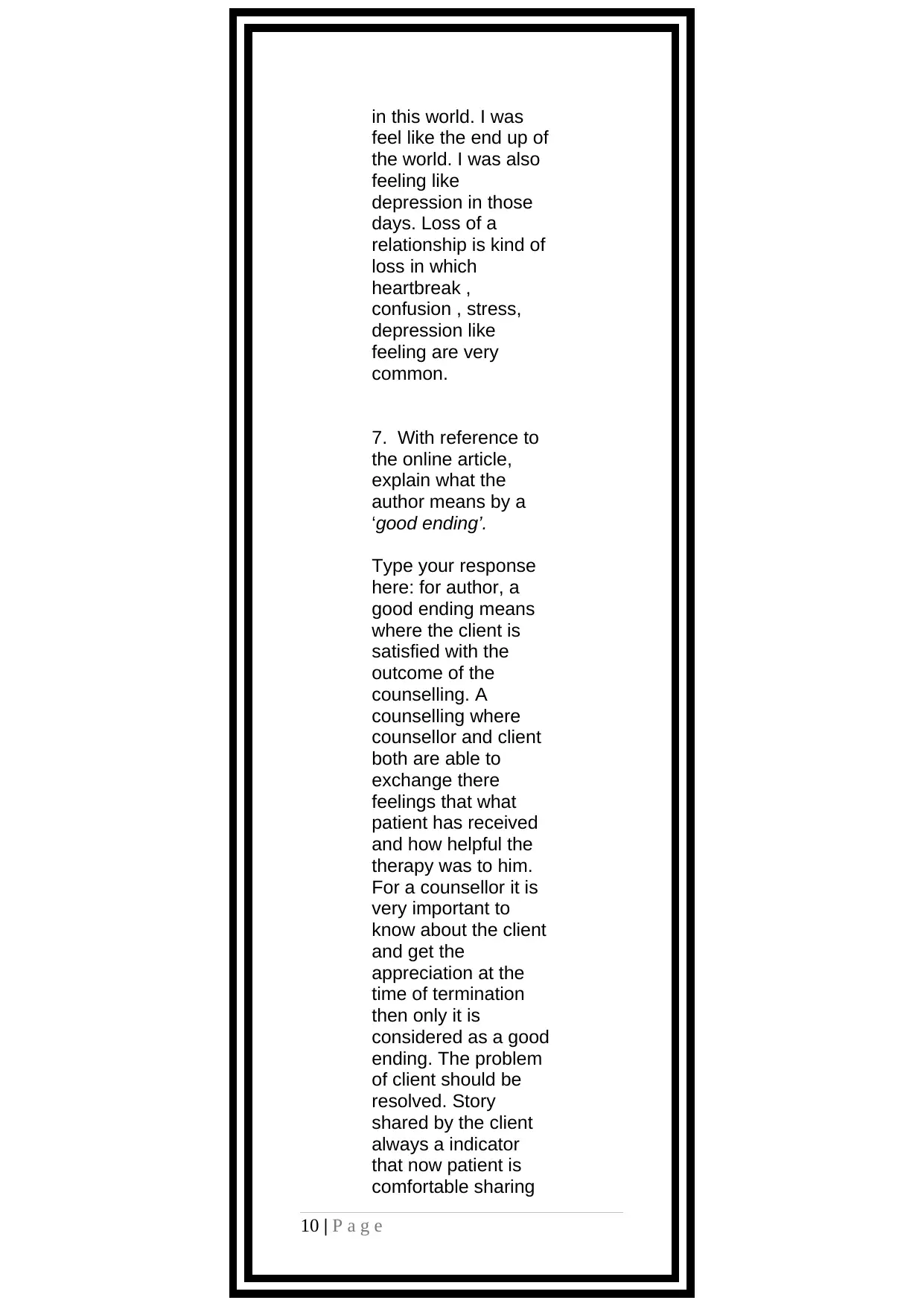
in this world. I was
feel like the end up of
the world. I was also
feeling like
depression in those
days. Loss of a
relationship is kind of
loss in which
heartbreak ,
confusion , stress,
depression like
feeling are very
common.
7. With reference to
the online article,
explain what the
author means by a
‘good ending’.
Type your response
here: for author, a
good ending means
where the client is
satisfied with the
outcome of the
counselling. A
counselling where
counsellor and client
both are able to
exchange there
feelings that what
patient has received
and how helpful the
therapy was to him.
For a counsellor it is
very important to
know about the client
and get the
appreciation at the
time of termination
then only it is
considered as a good
ending. The problem
of client should be
resolved. Story
shared by the client
always a indicator
that now patient is
comfortable sharing
10 | P a g e
feel like the end up of
the world. I was also
feeling like
depression in those
days. Loss of a
relationship is kind of
loss in which
heartbreak ,
confusion , stress,
depression like
feeling are very
common.
7. With reference to
the online article,
explain what the
author means by a
‘good ending’.
Type your response
here: for author, a
good ending means
where the client is
satisfied with the
outcome of the
counselling. A
counselling where
counsellor and client
both are able to
exchange there
feelings that what
patient has received
and how helpful the
therapy was to him.
For a counsellor it is
very important to
know about the client
and get the
appreciation at the
time of termination
then only it is
considered as a good
ending. The problem
of client should be
resolved. Story
shared by the client
always a indicator
that now patient is
comfortable sharing
10 | P a g e
Secure Best Marks with AI Grader
Need help grading? Try our AI Grader for instant feedback on your assignments.
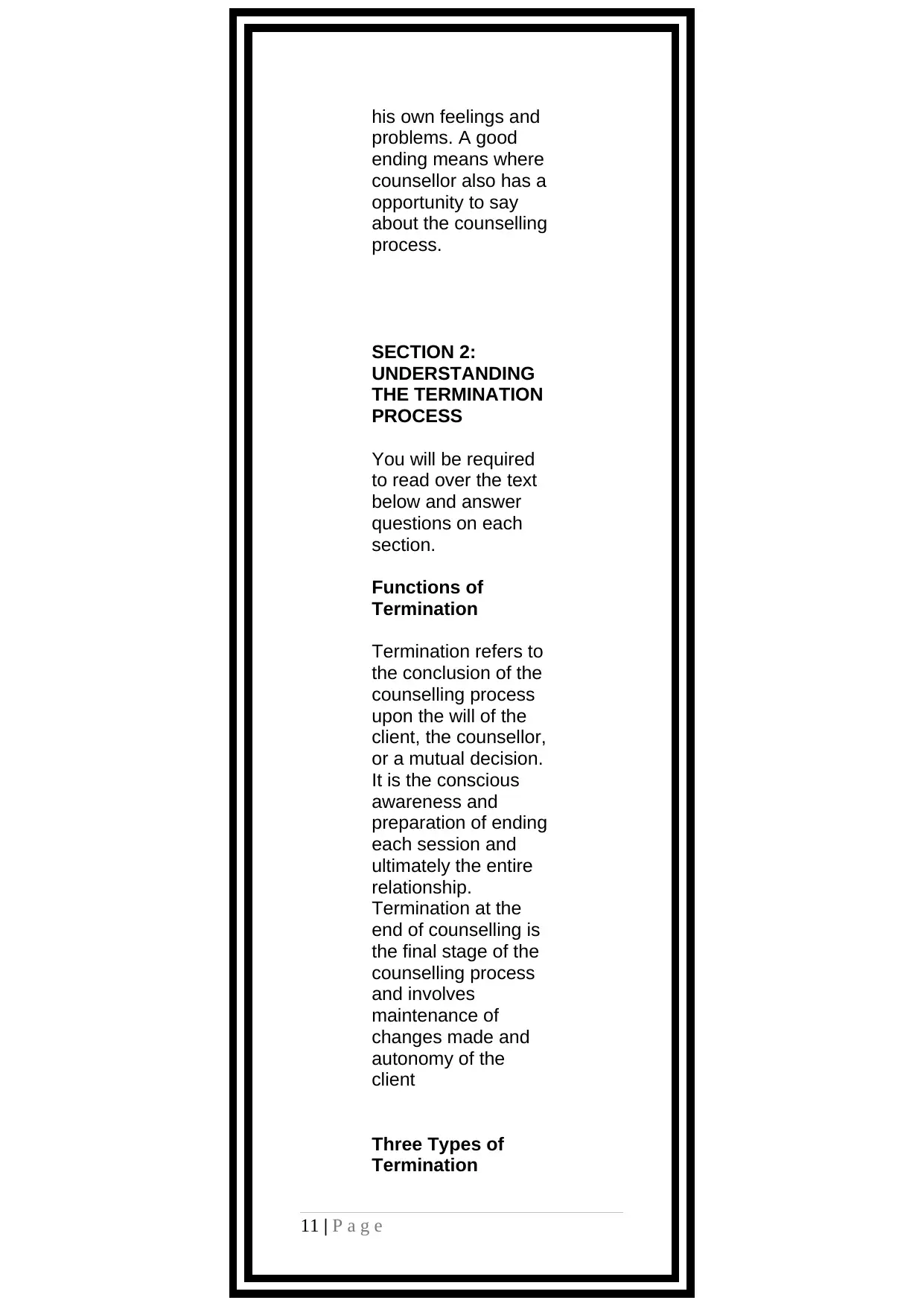
his own feelings and
problems. A good
ending means where
counsellor also has a
opportunity to say
about the counselling
process.
SECTION 2:
UNDERSTANDING
THE TERMINATION
PROCESS
You will be required
to read over the text
below and answer
questions on each
section.
Functions of
Termination
Termination refers to
the conclusion of the
counselling process
upon the will of the
client, the counsellor,
or a mutual decision.
It is the conscious
awareness and
preparation of ending
each session and
ultimately the entire
relationship.
Termination at the
end of counselling is
the final stage of the
counselling process
and involves
maintenance of
changes made and
autonomy of the
client
Three Types of
Termination
11 | P a g e
problems. A good
ending means where
counsellor also has a
opportunity to say
about the counselling
process.
SECTION 2:
UNDERSTANDING
THE TERMINATION
PROCESS
You will be required
to read over the text
below and answer
questions on each
section.
Functions of
Termination
Termination refers to
the conclusion of the
counselling process
upon the will of the
client, the counsellor,
or a mutual decision.
It is the conscious
awareness and
preparation of ending
each session and
ultimately the entire
relationship.
Termination at the
end of counselling is
the final stage of the
counselling process
and involves
maintenance of
changes made and
autonomy of the
client
Three Types of
Termination
11 | P a g e
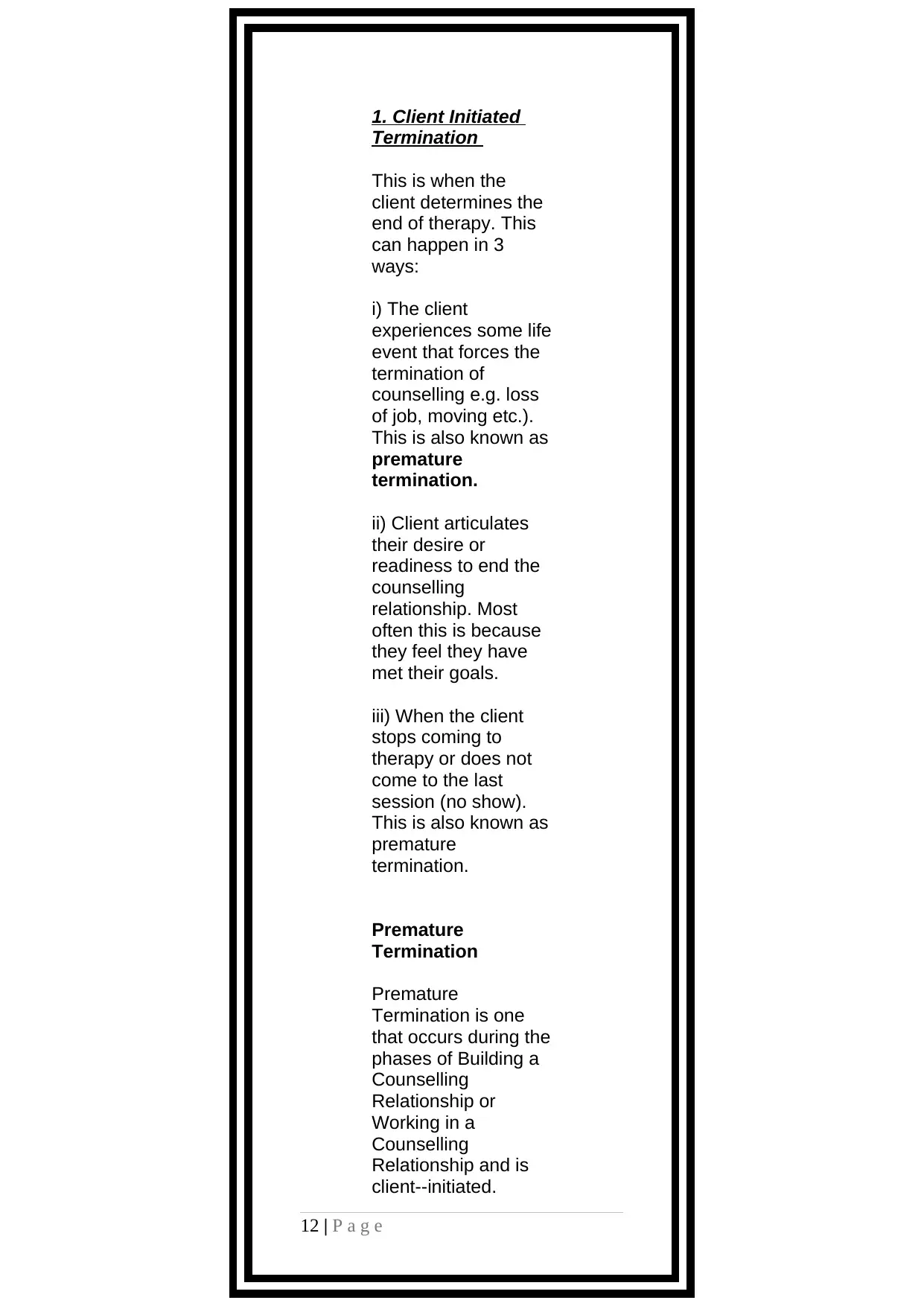
1. Client Initiated
Termination
This is when the
client determines the
end of therapy. This
can happen in 3
ways:
i) The client
experiences some life
event that forces the
termination of
counselling e.g. loss
of job, moving etc.).
This is also known as
premature
termination.
ii) Client articulates
their desire or
readiness to end the
counselling
relationship. Most
often this is because
they feel they have
met their goals.
iii) When the client
stops coming to
therapy or does not
come to the last
session (no show).
This is also known as
premature
termination.
Premature
Termination
Premature
Termination is one
that occurs during the
phases of Building a
Counselling
Relationship or
Working in a
Counselling
Relationship and is
client--initiated.
12 | P a g e
Termination
This is when the
client determines the
end of therapy. This
can happen in 3
ways:
i) The client
experiences some life
event that forces the
termination of
counselling e.g. loss
of job, moving etc.).
This is also known as
premature
termination.
ii) Client articulates
their desire or
readiness to end the
counselling
relationship. Most
often this is because
they feel they have
met their goals.
iii) When the client
stops coming to
therapy or does not
come to the last
session (no show).
This is also known as
premature
termination.
Premature
Termination
Premature
Termination is one
that occurs during the
phases of Building a
Counselling
Relationship or
Working in a
Counselling
Relationship and is
client--initiated.
12 | P a g e
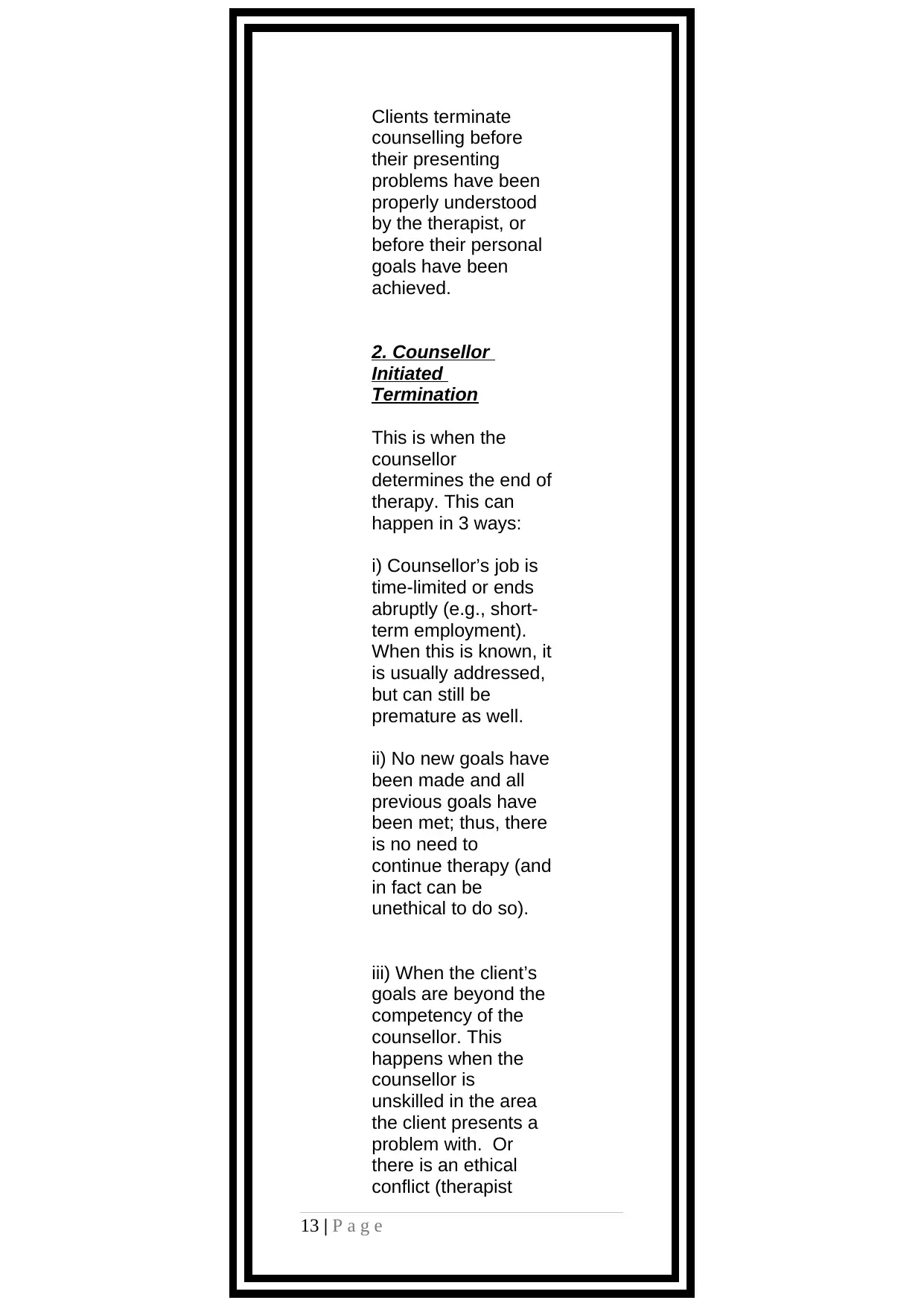
Clients terminate
counselling before
their presenting
problems have been
properly understood
by the therapist, or
before their personal
goals have been
achieved.
2. Counsellor
Initiated
Termination
This is when the
counsellor
determines the end of
therapy. This can
happen in 3 ways:
i) Counsellor’s job is
time-limited or ends
abruptly (e.g., short-
term employment).
When this is known, it
is usually addressed,
but can still be
premature as well.
ii) No new goals have
been made and all
previous goals have
been met; thus, there
is no need to
continue therapy (and
in fact can be
unethical to do so).
iii) When the client’s
goals are beyond the
competency of the
counsellor. This
happens when the
counsellor is
unskilled in the area
the client presents a
problem with. Or
there is an ethical
conflict (therapist
13 | P a g e
counselling before
their presenting
problems have been
properly understood
by the therapist, or
before their personal
goals have been
achieved.
2. Counsellor
Initiated
Termination
This is when the
counsellor
determines the end of
therapy. This can
happen in 3 ways:
i) Counsellor’s job is
time-limited or ends
abruptly (e.g., short-
term employment).
When this is known, it
is usually addressed,
but can still be
premature as well.
ii) No new goals have
been made and all
previous goals have
been met; thus, there
is no need to
continue therapy (and
in fact can be
unethical to do so).
iii) When the client’s
goals are beyond the
competency of the
counsellor. This
happens when the
counsellor is
unskilled in the area
the client presents a
problem with. Or
there is an ethical
conflict (therapist
13 | P a g e
Paraphrase This Document
Need a fresh take? Get an instant paraphrase of this document with our AI Paraphraser
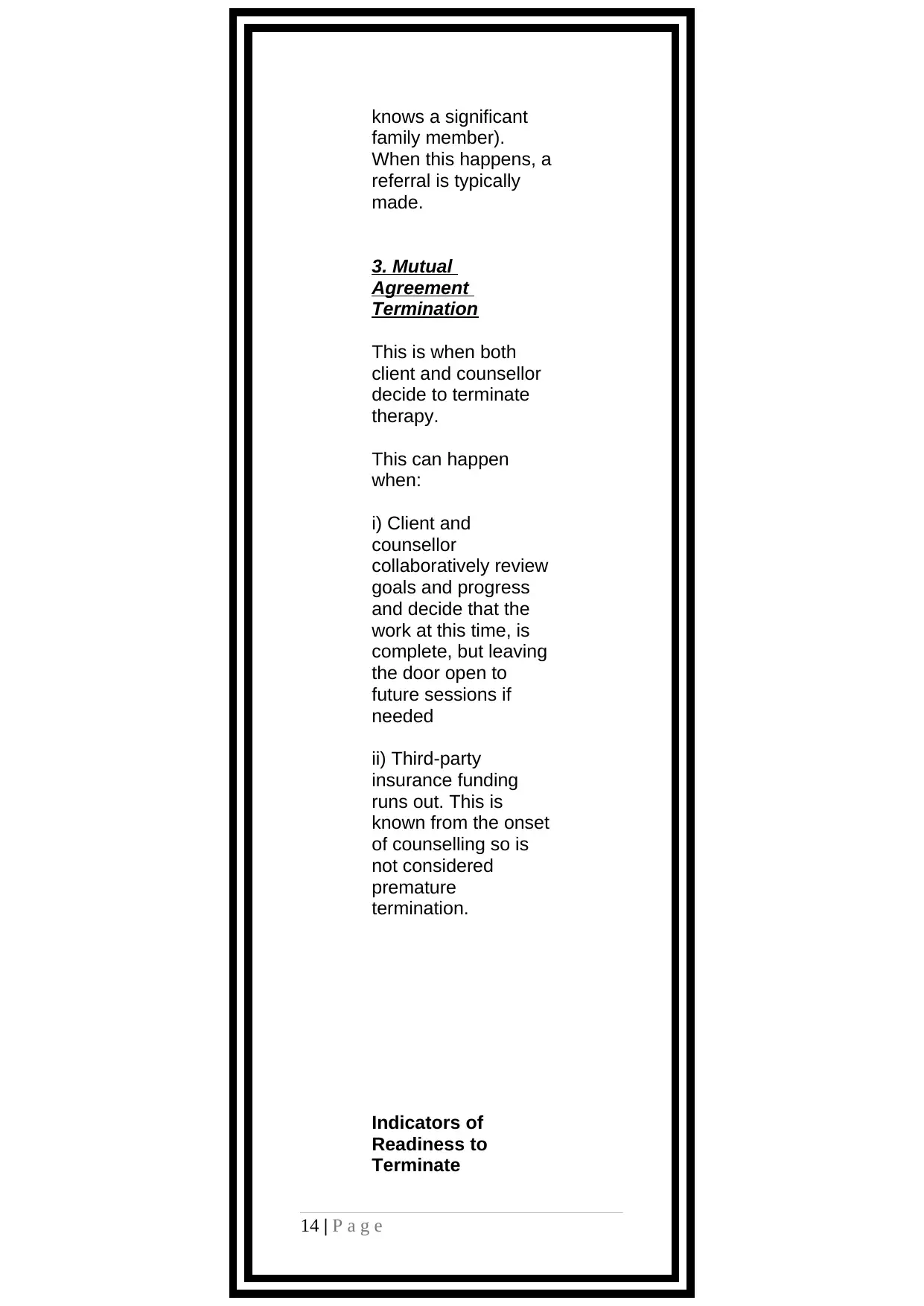
knows a significant
family member).
When this happens, a
referral is typically
made.
3. Mutual
Agreement
Termination
This is when both
client and counsellor
decide to terminate
therapy.
This can happen
when:
i) Client and
counsellor
collaboratively review
goals and progress
and decide that the
work at this time, is
complete, but leaving
the door open to
future sessions if
needed
ii) Third-party
insurance funding
runs out. This is
known from the onset
of counselling so is
not considered
premature
termination.
Indicators of
Readiness to
Terminate
14 | P a g e
family member).
When this happens, a
referral is typically
made.
3. Mutual
Agreement
Termination
This is when both
client and counsellor
decide to terminate
therapy.
This can happen
when:
i) Client and
counsellor
collaboratively review
goals and progress
and decide that the
work at this time, is
complete, but leaving
the door open to
future sessions if
needed
ii) Third-party
insurance funding
runs out. This is
known from the onset
of counselling so is
not considered
premature
termination.
Indicators of
Readiness to
Terminate
14 | P a g e
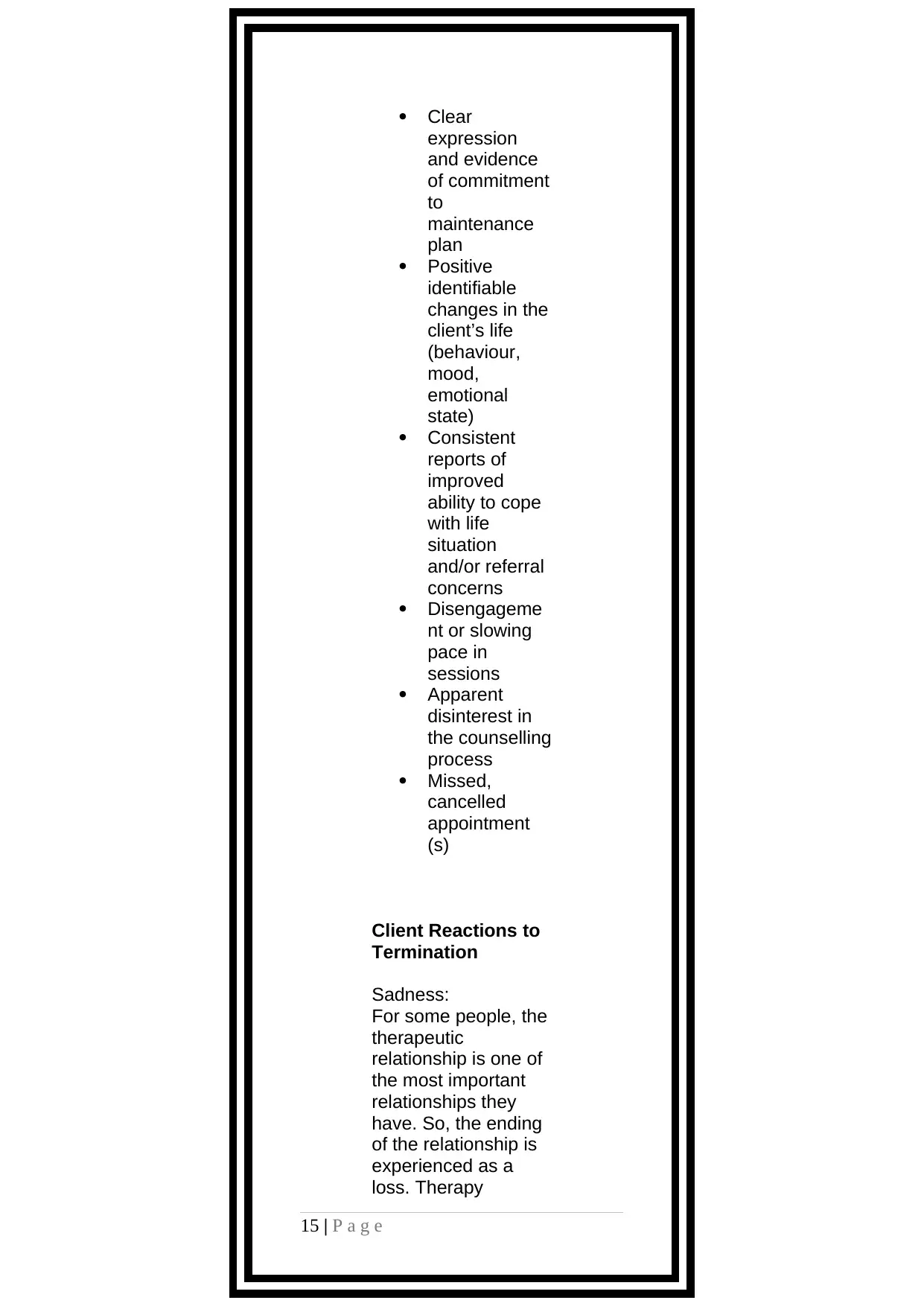
Clear
expression
and evidence
of commitment
to
maintenance
plan
Positive
identifiable
changes in the
client’s life
(behaviour,
mood,
emotional
state)
Consistent
reports of
improved
ability to cope
with life
situation
and/or referral
concerns
Disengageme
nt or slowing
pace in
sessions
Apparent
disinterest in
the counselling
process
Missed,
cancelled
appointment
(s)
Client Reactions to
Termination
Sadness:
For some people, the
therapeutic
relationship is one of
the most important
relationships they
have. So, the ending
of the relationship is
experienced as a
loss. Therapy
15 | P a g e
expression
and evidence
of commitment
to
maintenance
plan
Positive
identifiable
changes in the
client’s life
(behaviour,
mood,
emotional
state)
Consistent
reports of
improved
ability to cope
with life
situation
and/or referral
concerns
Disengageme
nt or slowing
pace in
sessions
Apparent
disinterest in
the counselling
process
Missed,
cancelled
appointment
(s)
Client Reactions to
Termination
Sadness:
For some people, the
therapeutic
relationship is one of
the most important
relationships they
have. So, the ending
of the relationship is
experienced as a
loss. Therapy
15 | P a g e
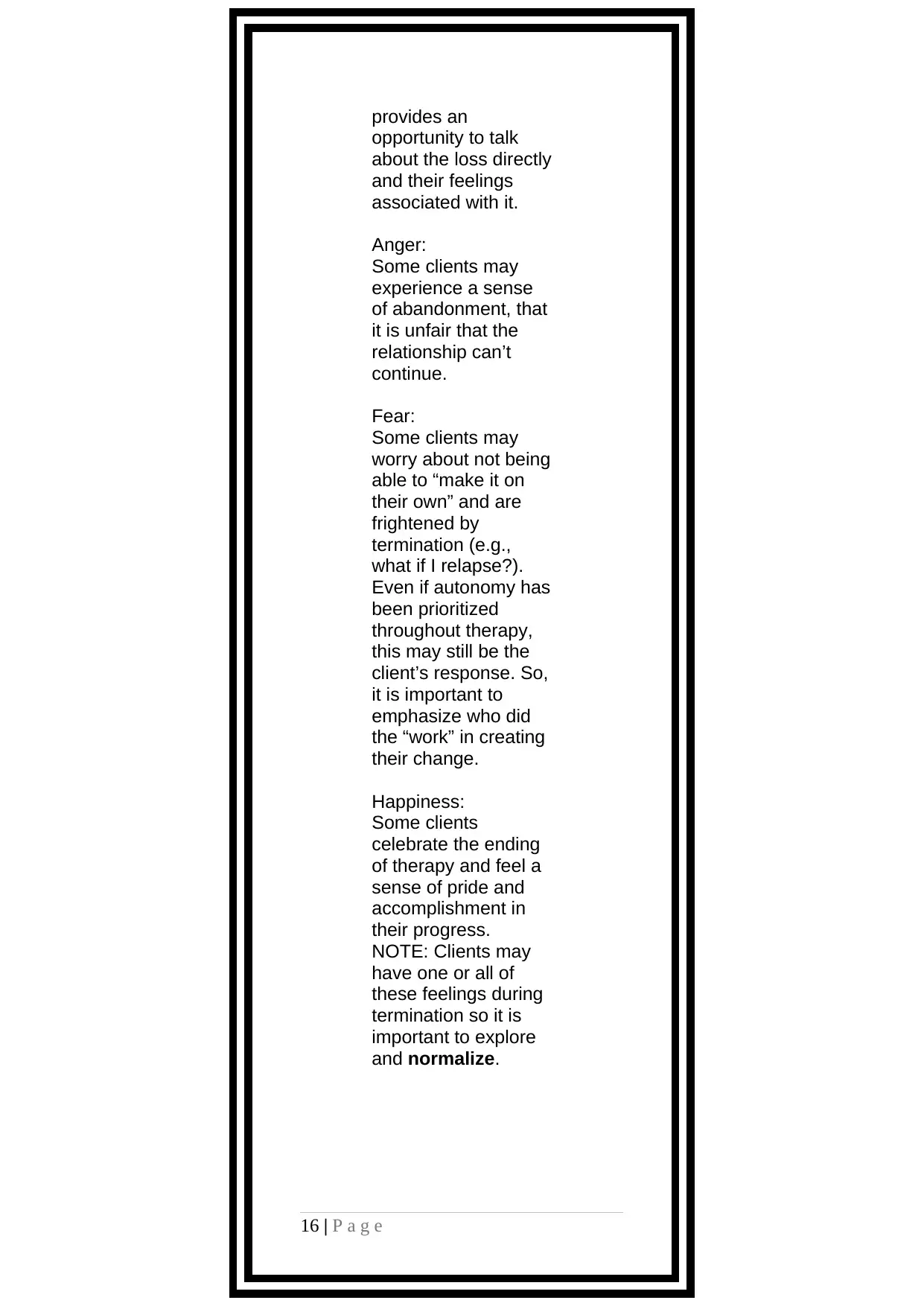
provides an
opportunity to talk
about the loss directly
and their feelings
associated with it.
Anger:
Some clients may
experience a sense
of abandonment, that
it is unfair that the
relationship can’t
continue.
Fear:
Some clients may
worry about not being
able to “make it on
their own” and are
frightened by
termination (e.g.,
what if I relapse?).
Even if autonomy has
been prioritized
throughout therapy,
this may still be the
client’s response. So,
it is important to
emphasize who did
the “work” in creating
their change.
Happiness:
Some clients
celebrate the ending
of therapy and feel a
sense of pride and
accomplishment in
their progress.
NOTE: Clients may
have one or all of
these feelings during
termination so it is
important to explore
and normalize.
16 | P a g e
opportunity to talk
about the loss directly
and their feelings
associated with it.
Anger:
Some clients may
experience a sense
of abandonment, that
it is unfair that the
relationship can’t
continue.
Fear:
Some clients may
worry about not being
able to “make it on
their own” and are
frightened by
termination (e.g.,
what if I relapse?).
Even if autonomy has
been prioritized
throughout therapy,
this may still be the
client’s response. So,
it is important to
emphasize who did
the “work” in creating
their change.
Happiness:
Some clients
celebrate the ending
of therapy and feel a
sense of pride and
accomplishment in
their progress.
NOTE: Clients may
have one or all of
these feelings during
termination so it is
important to explore
and normalize.
16 | P a g e
Secure Best Marks with AI Grader
Need help grading? Try our AI Grader for instant feedback on your assignments.
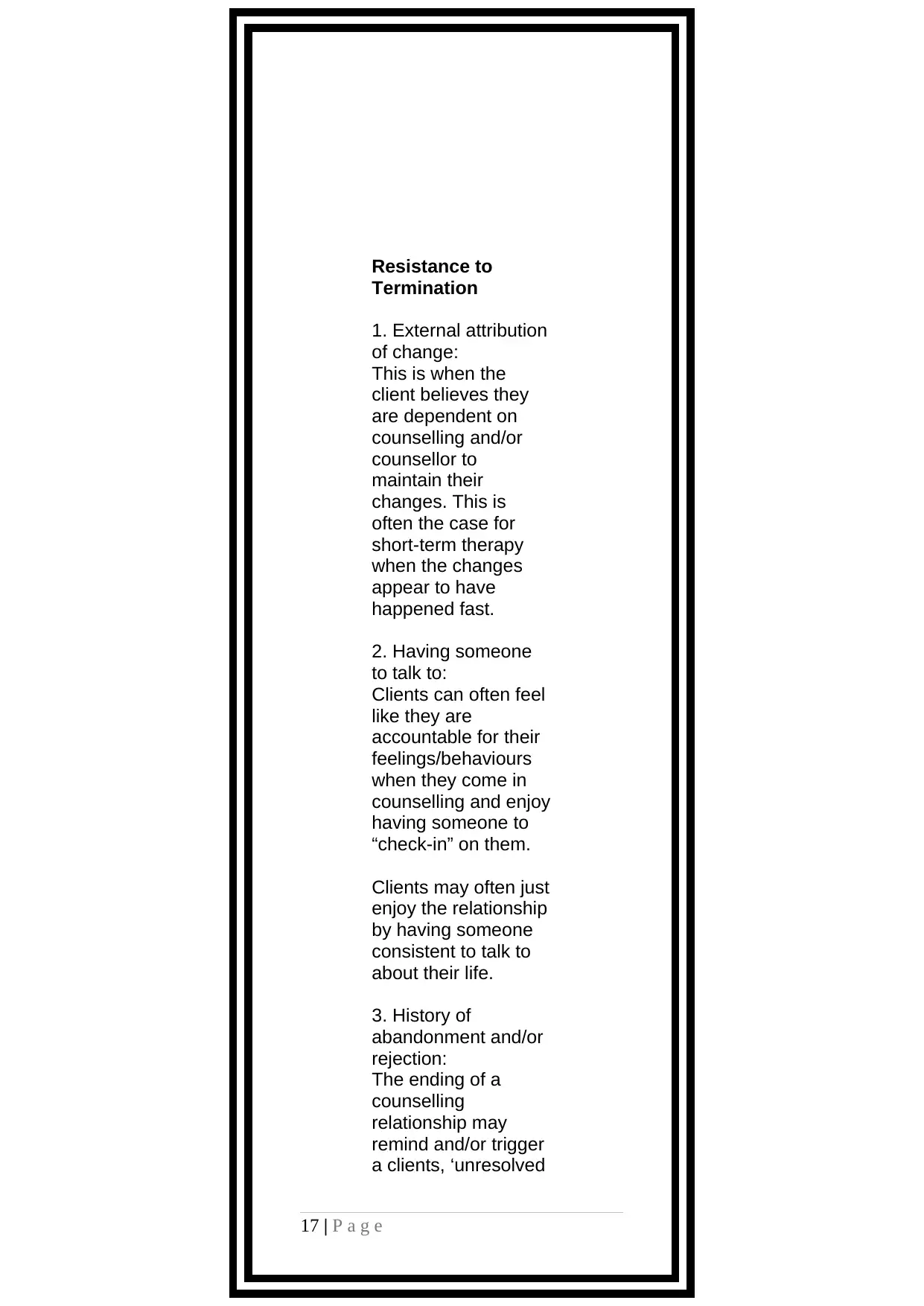
Resistance to
Termination
1. External attribution
of change:
This is when the
client believes they
are dependent on
counselling and/or
counsellor to
maintain their
changes. This is
often the case for
short-term therapy
when the changes
appear to have
happened fast.
2. Having someone
to talk to:
Clients can often feel
like they are
accountable for their
feelings/behaviours
when they come in
counselling and enjoy
having someone to
“check-in” on them.
Clients may often just
enjoy the relationship
by having someone
consistent to talk to
about their life.
3. History of
abandonment and/or
rejection:
The ending of a
counselling
relationship may
remind and/or trigger
a clients, ‘unresolved
17 | P a g e
Termination
1. External attribution
of change:
This is when the
client believes they
are dependent on
counselling and/or
counsellor to
maintain their
changes. This is
often the case for
short-term therapy
when the changes
appear to have
happened fast.
2. Having someone
to talk to:
Clients can often feel
like they are
accountable for their
feelings/behaviours
when they come in
counselling and enjoy
having someone to
“check-in” on them.
Clients may often just
enjoy the relationship
by having someone
consistent to talk to
about their life.
3. History of
abandonment and/or
rejection:
The ending of a
counselling
relationship may
remind and/or trigger
a clients, ‘unresolved
17 | P a g e
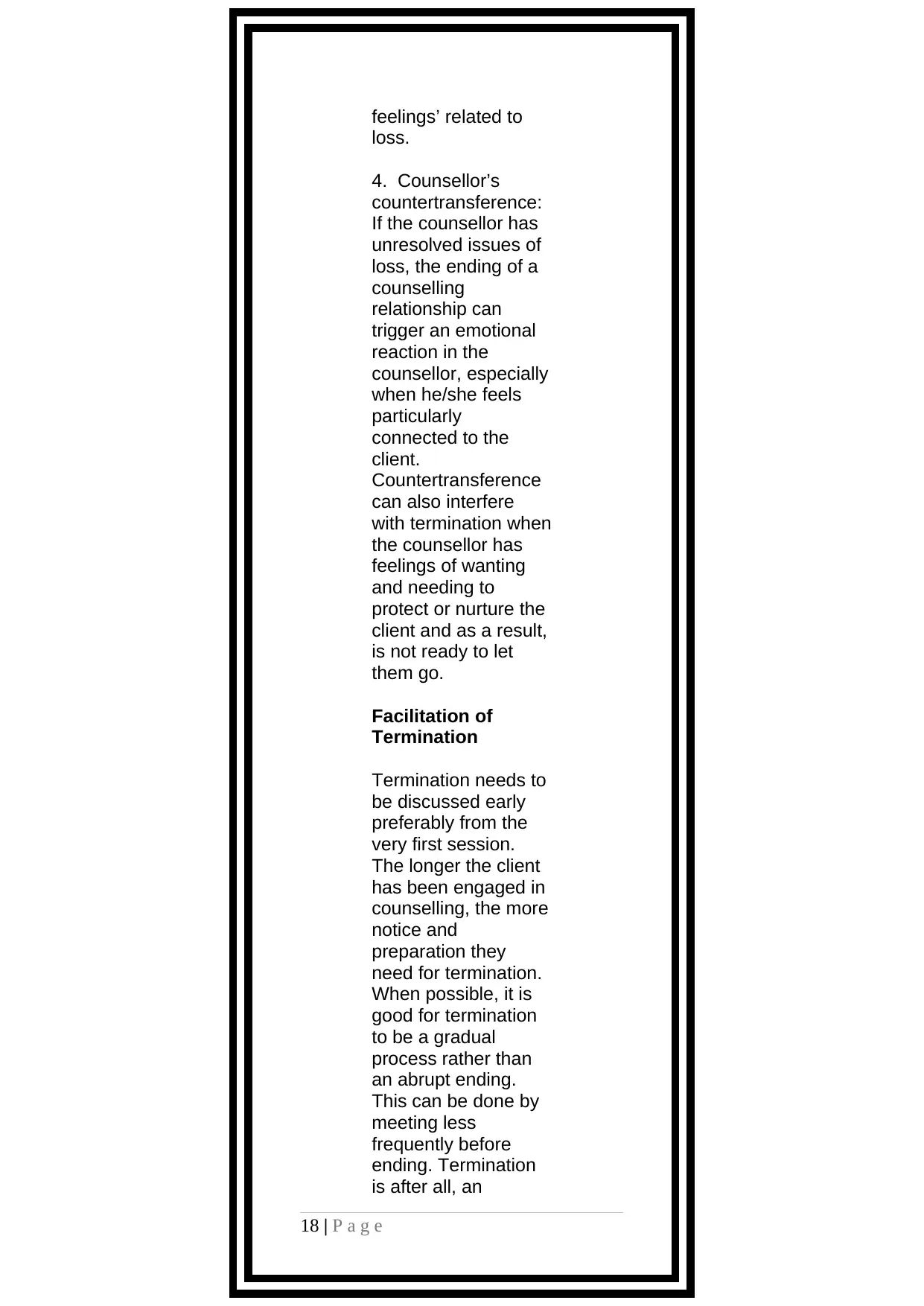
feelings’ related to
loss.
4. Counsellor’s
countertransference:
If the counsellor has
unresolved issues of
loss, the ending of a
counselling
relationship can
trigger an emotional
reaction in the
counsellor, especially
when he/she feels
particularly
connected to the
client.
Countertransference
can also interfere
with termination when
the counsellor has
feelings of wanting
and needing to
protect or nurture the
client and as a result,
is not ready to let
them go.
Facilitation of
Termination
Termination needs to
be discussed early
preferably from the
very first session.
The longer the client
has been engaged in
counselling, the more
notice and
preparation they
need for termination.
When possible, it is
good for termination
to be a gradual
process rather than
an abrupt ending.
This can be done by
meeting less
frequently before
ending. Termination
is after all, an
18 | P a g e
loss.
4. Counsellor’s
countertransference:
If the counsellor has
unresolved issues of
loss, the ending of a
counselling
relationship can
trigger an emotional
reaction in the
counsellor, especially
when he/she feels
particularly
connected to the
client.
Countertransference
can also interfere
with termination when
the counsellor has
feelings of wanting
and needing to
protect or nurture the
client and as a result,
is not ready to let
them go.
Facilitation of
Termination
Termination needs to
be discussed early
preferably from the
very first session.
The longer the client
has been engaged in
counselling, the more
notice and
preparation they
need for termination.
When possible, it is
good for termination
to be a gradual
process rather than
an abrupt ending.
This can be done by
meeting less
frequently before
ending. Termination
is after all, an
18 | P a g e
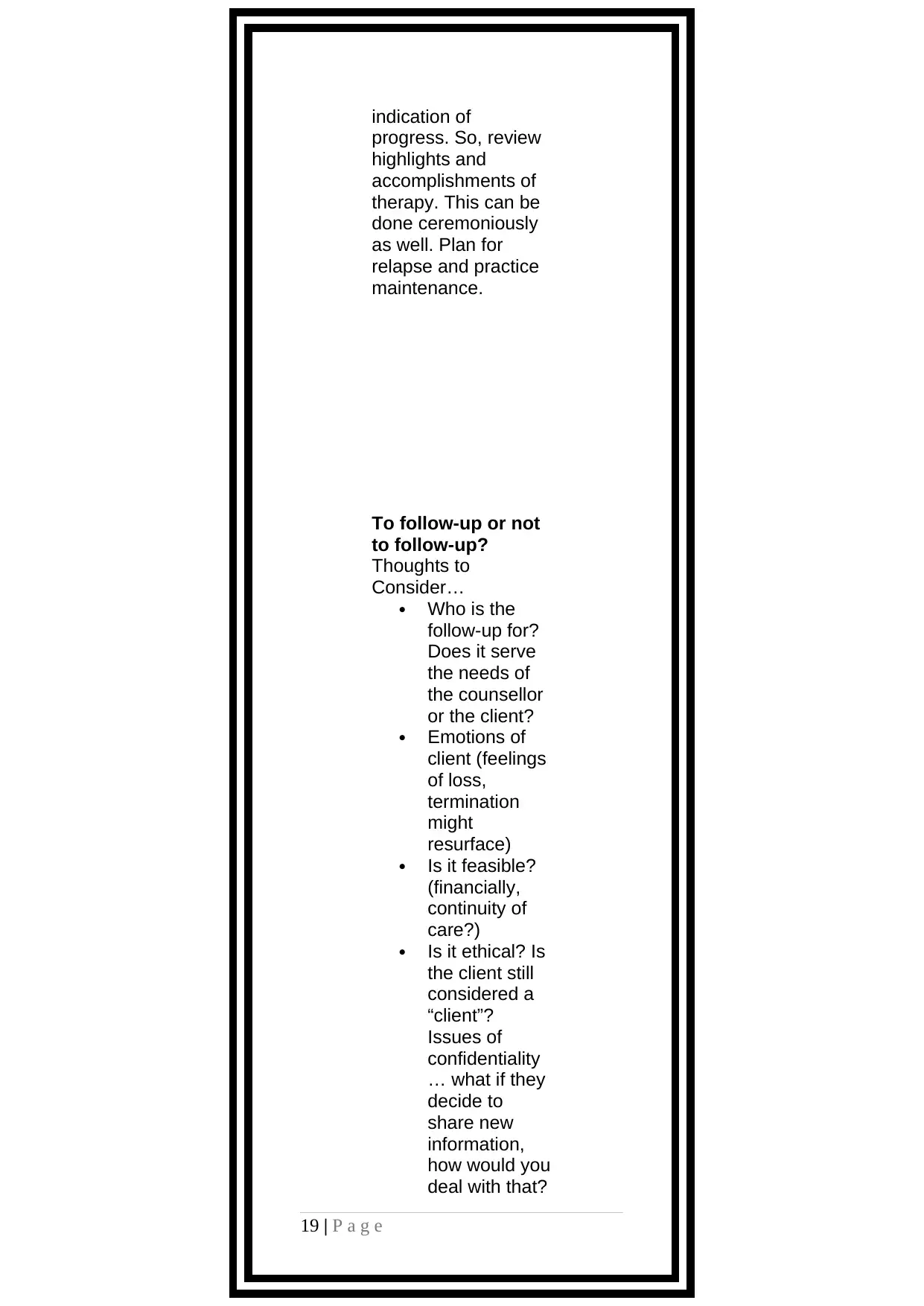
indication of
progress. So, review
highlights and
accomplishments of
therapy. This can be
done ceremoniously
as well. Plan for
relapse and practice
maintenance.
To follow-up or not
to follow-up?
Thoughts to
Consider…
Who is the
follow-up for?
Does it serve
the needs of
the counsellor
or the client?
Emotions of
client (feelings
of loss,
termination
might
resurface)
Is it feasible?
(financially,
continuity of
care?)
Is it ethical? Is
the client still
considered a
“client”?
Issues of
confidentiality
… what if they
decide to
share new
information,
how would you
deal with that?
19 | P a g e
progress. So, review
highlights and
accomplishments of
therapy. This can be
done ceremoniously
as well. Plan for
relapse and practice
maintenance.
To follow-up or not
to follow-up?
Thoughts to
Consider…
Who is the
follow-up for?
Does it serve
the needs of
the counsellor
or the client?
Emotions of
client (feelings
of loss,
termination
might
resurface)
Is it feasible?
(financially,
continuity of
care?)
Is it ethical? Is
the client still
considered a
“client”?
Issues of
confidentiality
… what if they
decide to
share new
information,
how would you
deal with that?
19 | P a g e
Paraphrase This Document
Need a fresh take? Get an instant paraphrase of this document with our AI Paraphraser
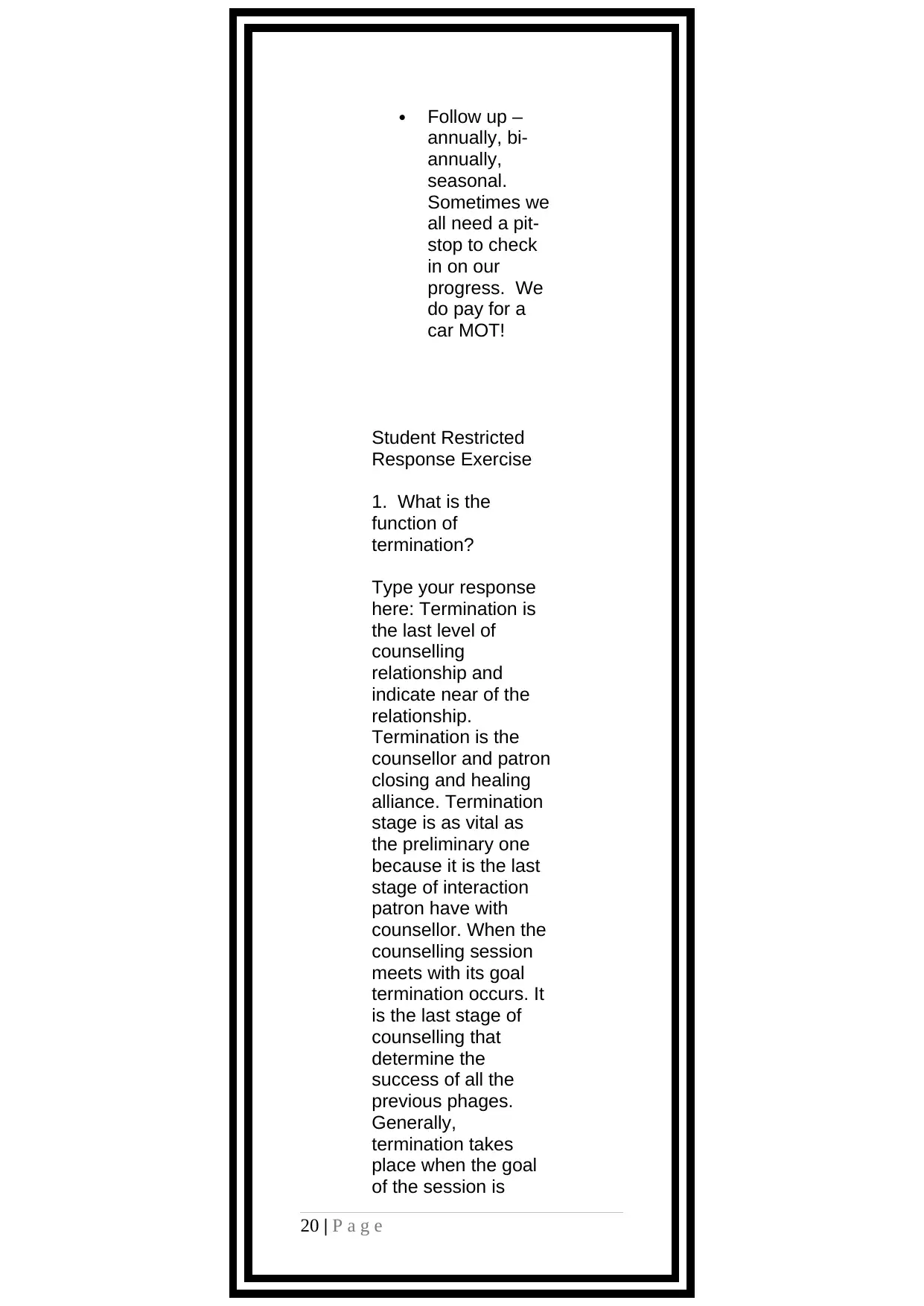
Follow up –
annually, bi-
annually,
seasonal.
Sometimes we
all need a pit-
stop to check
in on our
progress. We
do pay for a
car MOT!
Student Restricted
Response Exercise
1. What is the
function of
termination?
Type your response
here: Termination is
the last level of
counselling
relationship and
indicate near of the
relationship.
Termination is the
counsellor and patron
closing and healing
alliance. Termination
stage is as vital as
the preliminary one
because it is the last
stage of interaction
patron have with
counsellor. When the
counselling session
meets with its goal
termination occurs. It
is the last stage of
counselling that
determine the
success of all the
previous phages.
Generally,
termination takes
place when the goal
of the session is
20 | P a g e
annually, bi-
annually,
seasonal.
Sometimes we
all need a pit-
stop to check
in on our
progress. We
do pay for a
car MOT!
Student Restricted
Response Exercise
1. What is the
function of
termination?
Type your response
here: Termination is
the last level of
counselling
relationship and
indicate near of the
relationship.
Termination is the
counsellor and patron
closing and healing
alliance. Termination
stage is as vital as
the preliminary one
because it is the last
stage of interaction
patron have with
counsellor. When the
counselling session
meets with its goal
termination occurs. It
is the last stage of
counselling that
determine the
success of all the
previous phages.
Generally,
termination takes
place when the goal
of the session is
20 | P a g e
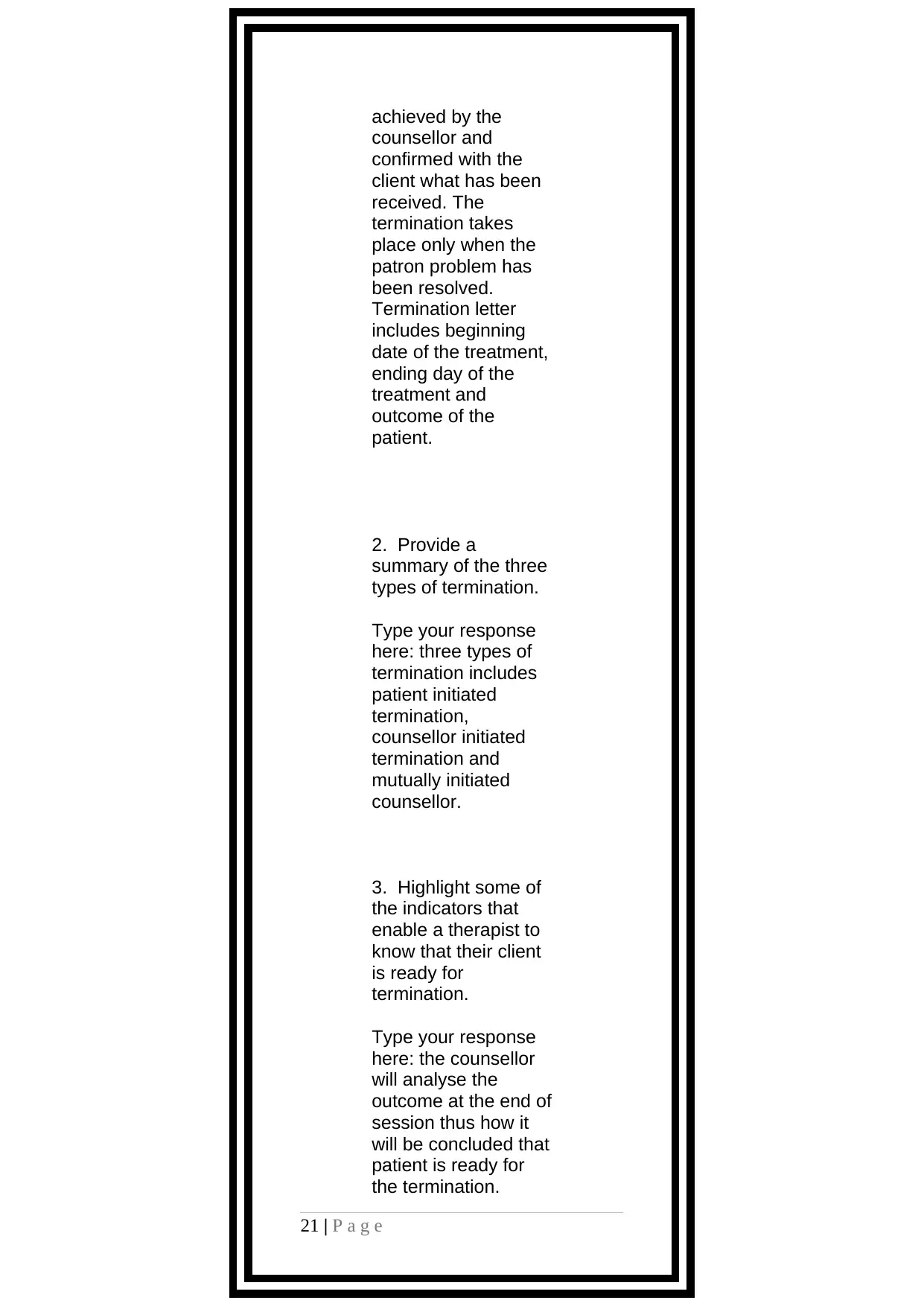
achieved by the
counsellor and
confirmed with the
client what has been
received. The
termination takes
place only when the
patron problem has
been resolved.
Termination letter
includes beginning
date of the treatment,
ending day of the
treatment and
outcome of the
patient.
2. Provide a
summary of the three
types of termination.
Type your response
here: three types of
termination includes
patient initiated
termination,
counsellor initiated
termination and
mutually initiated
counsellor.
3. Highlight some of
the indicators that
enable a therapist to
know that their client
is ready for
termination.
Type your response
here: the counsellor
will analyse the
outcome at the end of
session thus how it
will be concluded that
patient is ready for
the termination.
21 | P a g e
counsellor and
confirmed with the
client what has been
received. The
termination takes
place only when the
patron problem has
been resolved.
Termination letter
includes beginning
date of the treatment,
ending day of the
treatment and
outcome of the
patient.
2. Provide a
summary of the three
types of termination.
Type your response
here: three types of
termination includes
patient initiated
termination,
counsellor initiated
termination and
mutually initiated
counsellor.
3. Highlight some of
the indicators that
enable a therapist to
know that their client
is ready for
termination.
Type your response
here: the counsellor
will analyse the
outcome at the end of
session thus how it
will be concluded that
patient is ready for
the termination.
21 | P a g e
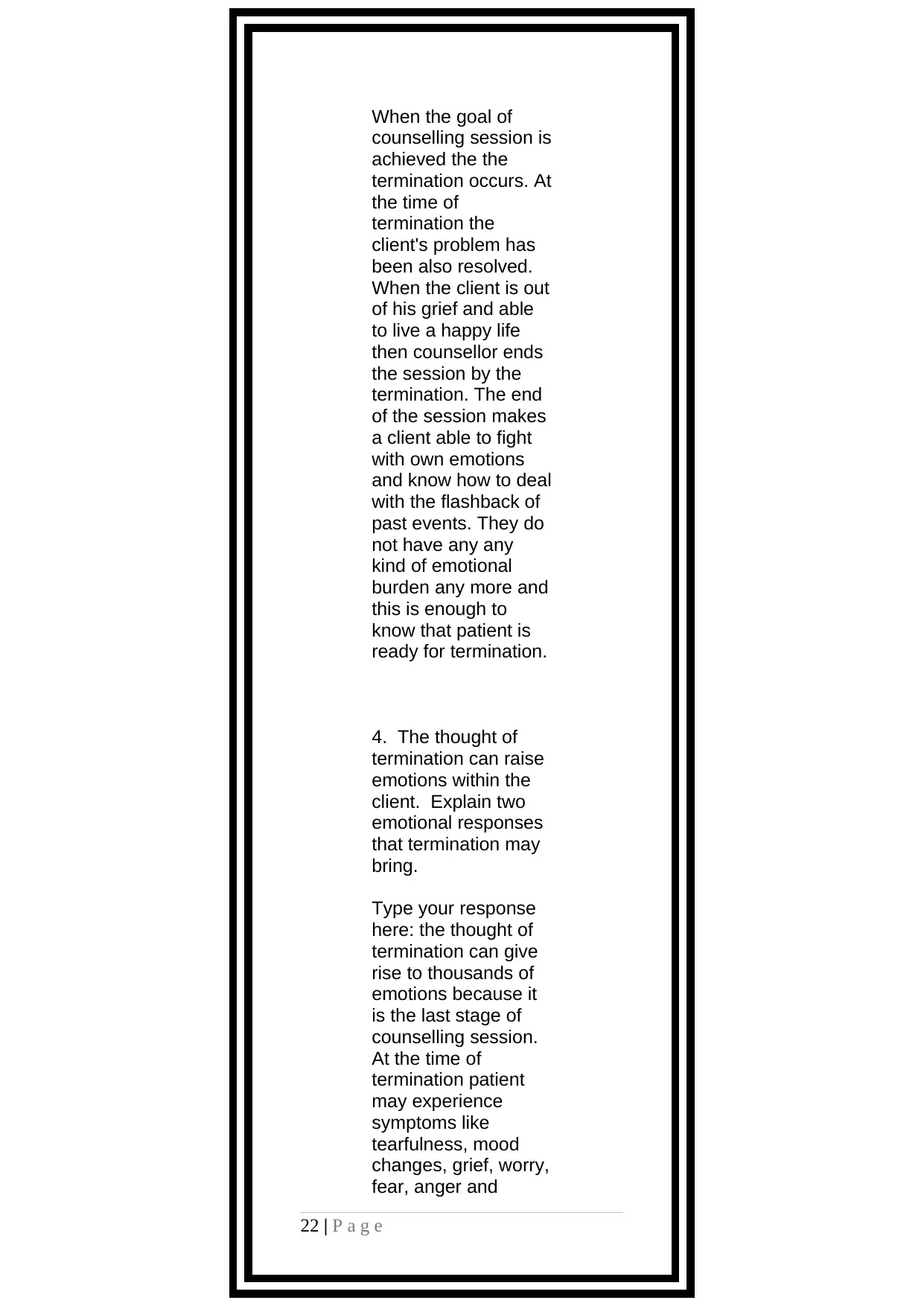
When the goal of
counselling session is
achieved the the
termination occurs. At
the time of
termination the
client's problem has
been also resolved.
When the client is out
of his grief and able
to live a happy life
then counsellor ends
the session by the
termination. The end
of the session makes
a client able to fight
with own emotions
and know how to deal
with the flashback of
past events. They do
not have any any
kind of emotional
burden any more and
this is enough to
know that patient is
ready for termination.
4. The thought of
termination can raise
emotions within the
client. Explain two
emotional responses
that termination may
bring.
Type your response
here: the thought of
termination can give
rise to thousands of
emotions because it
is the last stage of
counselling session.
At the time of
termination patient
may experience
symptoms like
tearfulness, mood
changes, grief, worry,
fear, anger and
22 | P a g e
counselling session is
achieved the the
termination occurs. At
the time of
termination the
client's problem has
been also resolved.
When the client is out
of his grief and able
to live a happy life
then counsellor ends
the session by the
termination. The end
of the session makes
a client able to fight
with own emotions
and know how to deal
with the flashback of
past events. They do
not have any any
kind of emotional
burden any more and
this is enough to
know that patient is
ready for termination.
4. The thought of
termination can raise
emotions within the
client. Explain two
emotional responses
that termination may
bring.
Type your response
here: the thought of
termination can give
rise to thousands of
emotions because it
is the last stage of
counselling session.
At the time of
termination patient
may experience
symptoms like
tearfulness, mood
changes, grief, worry,
fear, anger and
22 | P a g e
Secure Best Marks with AI Grader
Need help grading? Try our AI Grader for instant feedback on your assignments.
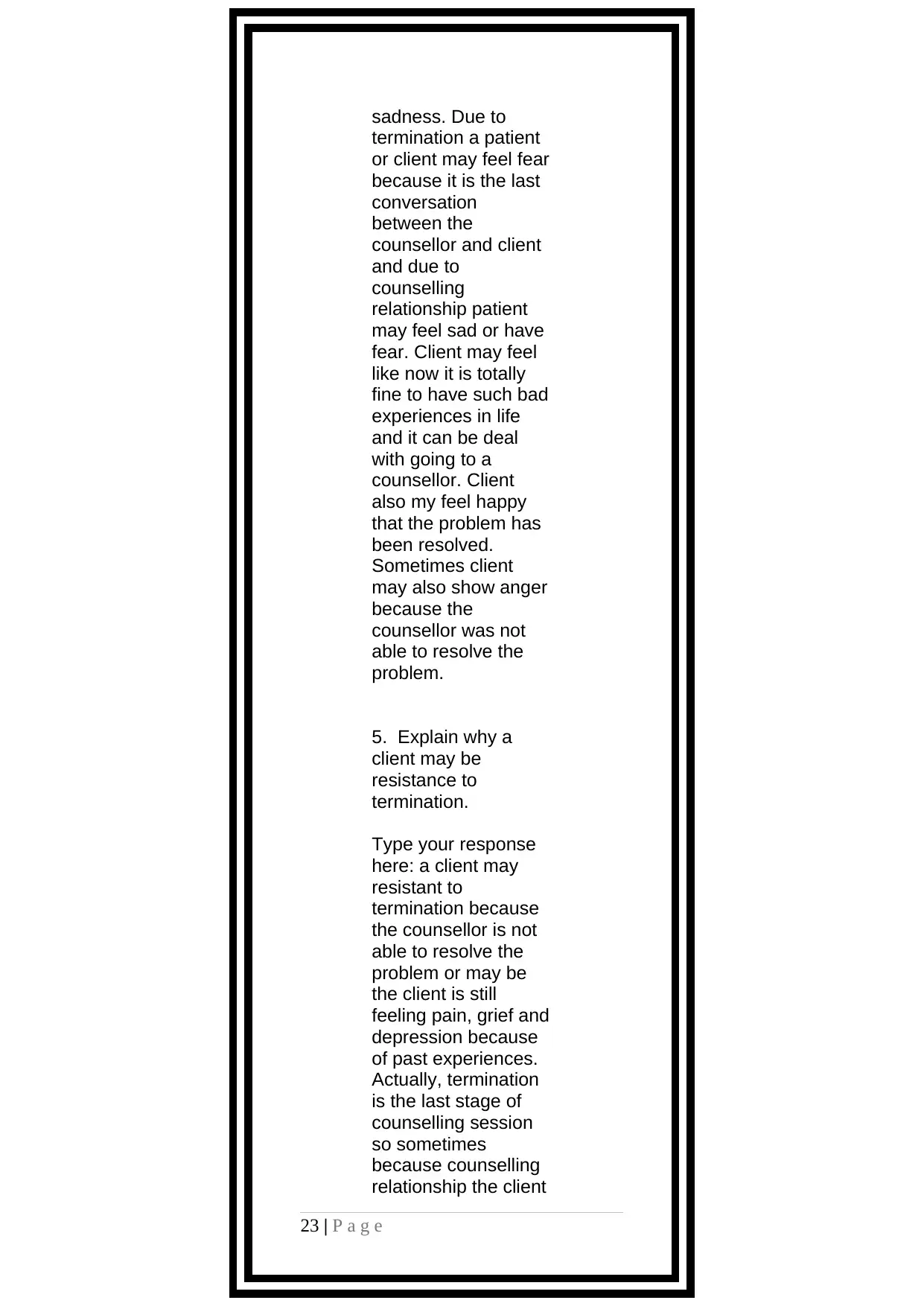
sadness. Due to
termination a patient
or client may feel fear
because it is the last
conversation
between the
counsellor and client
and due to
counselling
relationship patient
may feel sad or have
fear. Client may feel
like now it is totally
fine to have such bad
experiences in life
and it can be deal
with going to a
counsellor. Client
also my feel happy
that the problem has
been resolved.
Sometimes client
may also show anger
because the
counsellor was not
able to resolve the
problem.
5. Explain why a
client may be
resistance to
termination.
Type your response
here: a client may
resistant to
termination because
the counsellor is not
able to resolve the
problem or may be
the client is still
feeling pain, grief and
depression because
of past experiences.
Actually, termination
is the last stage of
counselling session
so sometimes
because counselling
relationship the client
23 | P a g e
termination a patient
or client may feel fear
because it is the last
conversation
between the
counsellor and client
and due to
counselling
relationship patient
may feel sad or have
fear. Client may feel
like now it is totally
fine to have such bad
experiences in life
and it can be deal
with going to a
counsellor. Client
also my feel happy
that the problem has
been resolved.
Sometimes client
may also show anger
because the
counsellor was not
able to resolve the
problem.
5. Explain why a
client may be
resistance to
termination.
Type your response
here: a client may
resistant to
termination because
the counsellor is not
able to resolve the
problem or may be
the client is still
feeling pain, grief and
depression because
of past experiences.
Actually, termination
is the last stage of
counselling session
so sometimes
because counselling
relationship the client
23 | P a g e
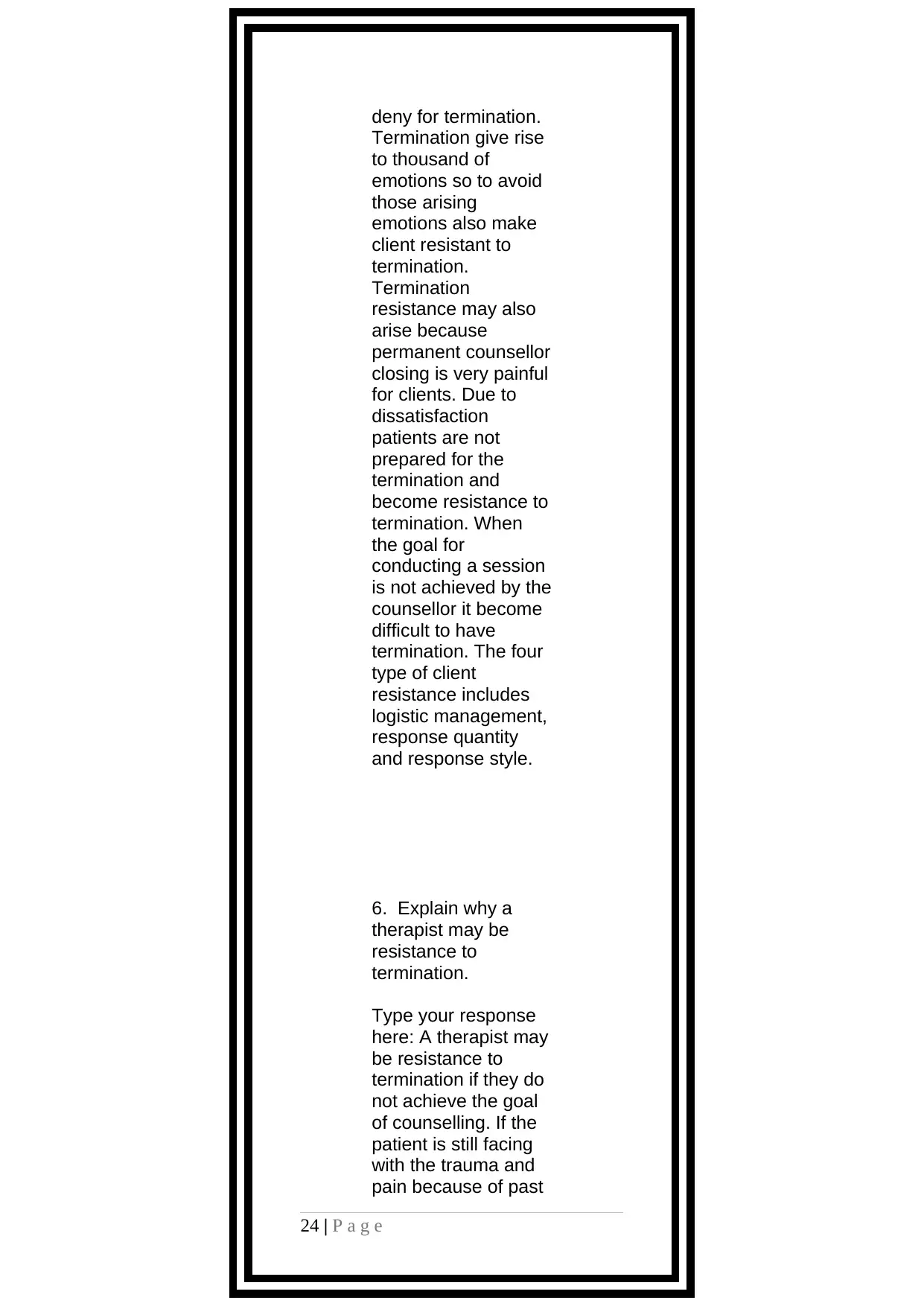
deny for termination.
Termination give rise
to thousand of
emotions so to avoid
those arising
emotions also make
client resistant to
termination.
Termination
resistance may also
arise because
permanent counsellor
closing is very painful
for clients. Due to
dissatisfaction
patients are not
prepared for the
termination and
become resistance to
termination. When
the goal for
conducting a session
is not achieved by the
counsellor it become
difficult to have
termination. The four
type of client
resistance includes
logistic management,
response quantity
and response style.
6. Explain why a
therapist may be
resistance to
termination.
Type your response
here: A therapist may
be resistance to
termination if they do
not achieve the goal
of counselling. If the
patient is still facing
with the trauma and
pain because of past
24 | P a g e
Termination give rise
to thousand of
emotions so to avoid
those arising
emotions also make
client resistant to
termination.
Termination
resistance may also
arise because
permanent counsellor
closing is very painful
for clients. Due to
dissatisfaction
patients are not
prepared for the
termination and
become resistance to
termination. When
the goal for
conducting a session
is not achieved by the
counsellor it become
difficult to have
termination. The four
type of client
resistance includes
logistic management,
response quantity
and response style.
6. Explain why a
therapist may be
resistance to
termination.
Type your response
here: A therapist may
be resistance to
termination if they do
not achieve the goal
of counselling. If the
patient is still facing
with the trauma and
pain because of past
24 | P a g e
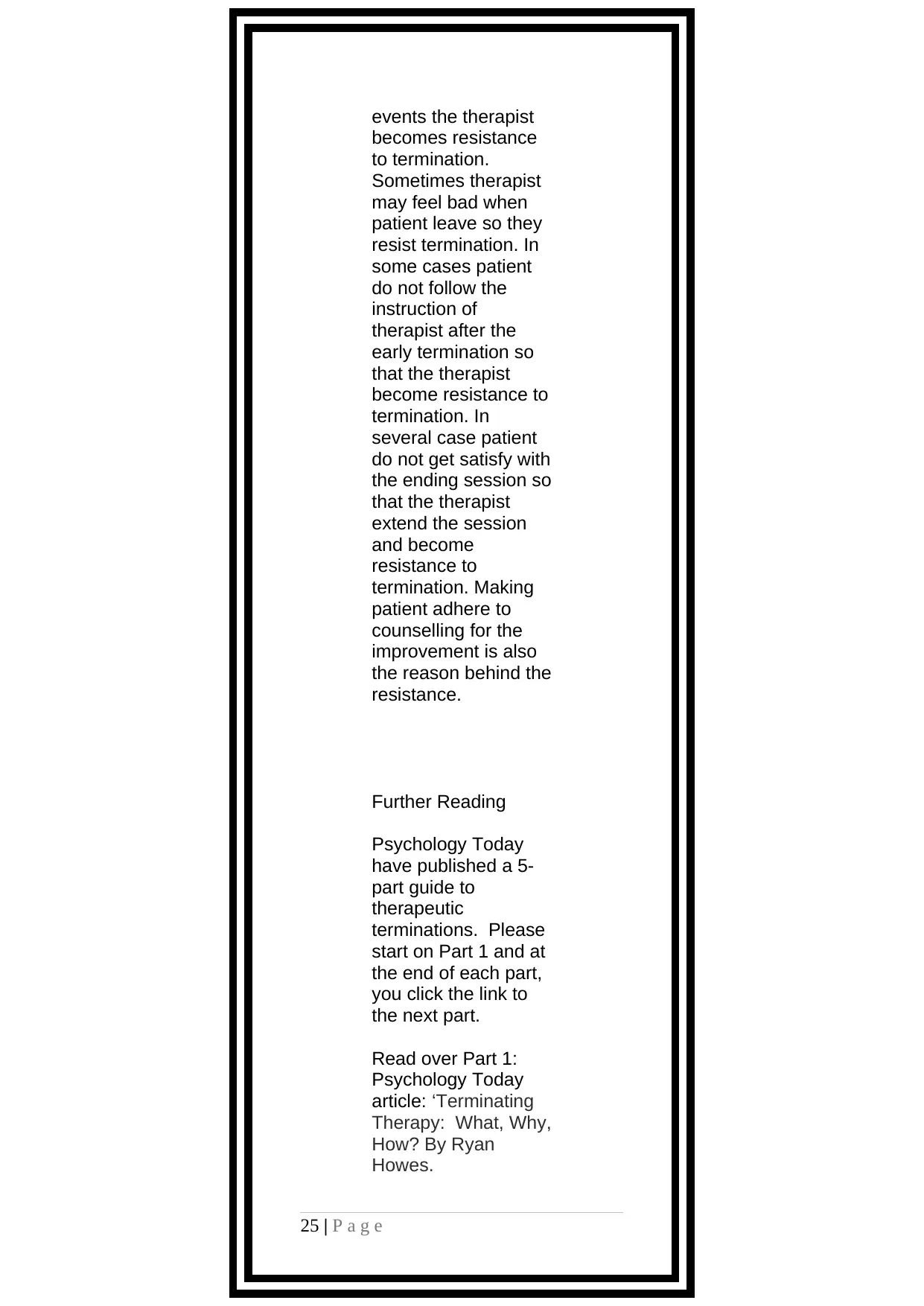
events the therapist
becomes resistance
to termination.
Sometimes therapist
may feel bad when
patient leave so they
resist termination. In
some cases patient
do not follow the
instruction of
therapist after the
early termination so
that the therapist
become resistance to
termination. In
several case patient
do not get satisfy with
the ending session so
that the therapist
extend the session
and become
resistance to
termination. Making
patient adhere to
counselling for the
improvement is also
the reason behind the
resistance.
Further Reading
Psychology Today
have published a 5-
part guide to
therapeutic
terminations. Please
start on Part 1 and at
the end of each part,
you click the link to
the next part.
Read over Part 1:
Psychology Today
article: ‘Terminating
Therapy: What, Why,
How? By Ryan
Howes.
25 | P a g e
becomes resistance
to termination.
Sometimes therapist
may feel bad when
patient leave so they
resist termination. In
some cases patient
do not follow the
instruction of
therapist after the
early termination so
that the therapist
become resistance to
termination. In
several case patient
do not get satisfy with
the ending session so
that the therapist
extend the session
and become
resistance to
termination. Making
patient adhere to
counselling for the
improvement is also
the reason behind the
resistance.
Further Reading
Psychology Today
have published a 5-
part guide to
therapeutic
terminations. Please
start on Part 1 and at
the end of each part,
you click the link to
the next part.
Read over Part 1:
Psychology Today
article: ‘Terminating
Therapy: What, Why,
How? By Ryan
Howes.
25 | P a g e
Paraphrase This Document
Need a fresh take? Get an instant paraphrase of this document with our AI Paraphraser
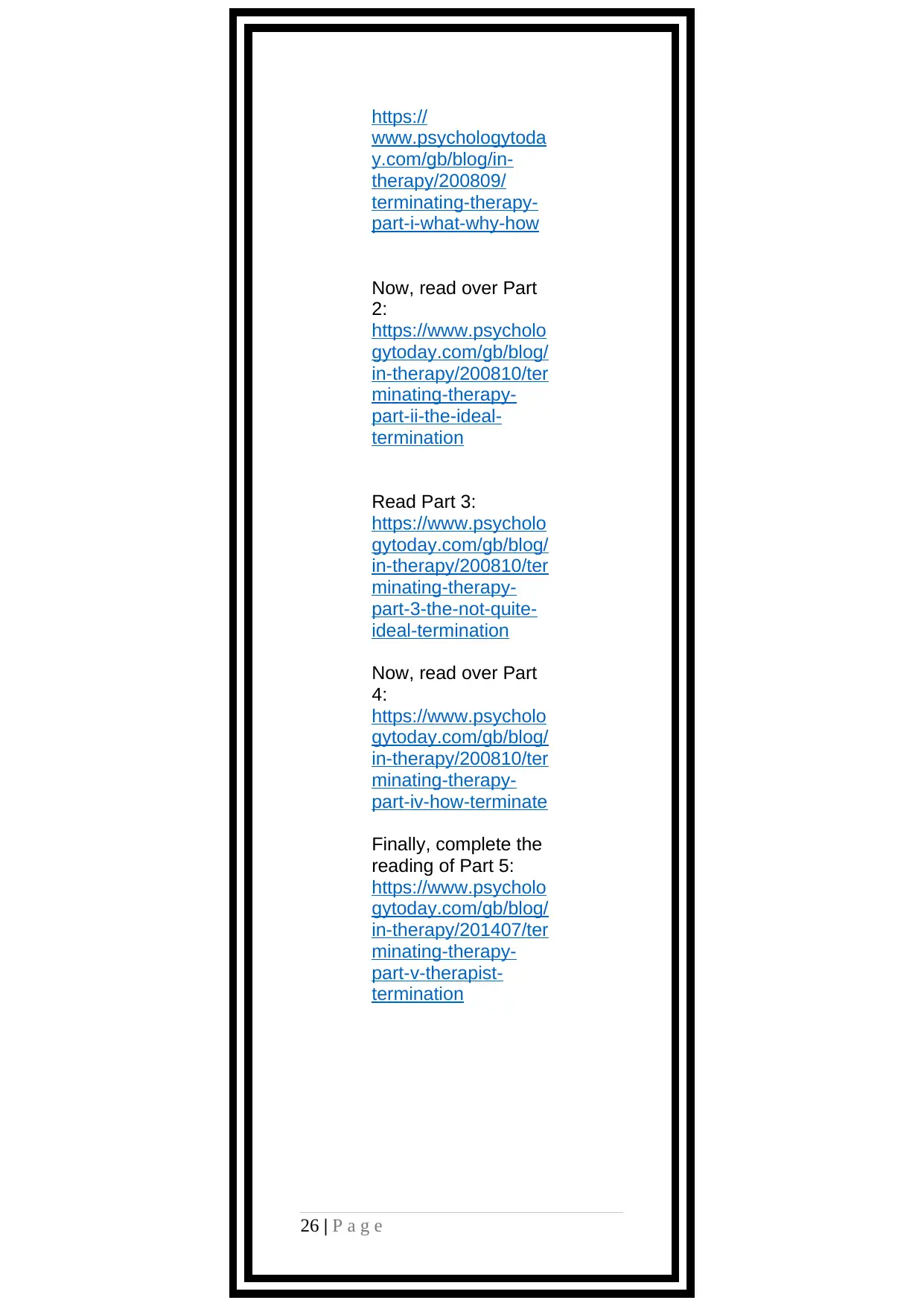
https://
www.psychologytoda
y.com/gb/blog/in-
therapy/200809/
terminating-therapy-
part-i-what-why-how
Now, read over Part
2:
https://www.psycholo
gytoday.com/gb/blog/
in-therapy/200810/ter
minating-therapy-
part-ii-the-ideal-
termination
Read Part 3:
https://www.psycholo
gytoday.com/gb/blog/
in-therapy/200810/ter
minating-therapy-
part-3-the-not-quite-
ideal-termination
Now, read over Part
4:
https://www.psycholo
gytoday.com/gb/blog/
in-therapy/200810/ter
minating-therapy-
part-iv-how-terminate
Finally, complete the
reading of Part 5:
https://www.psycholo
gytoday.com/gb/blog/
in-therapy/201407/ter
minating-therapy-
part-v-therapist-
termination
26 | P a g e
www.psychologytoda
y.com/gb/blog/in-
therapy/200809/
terminating-therapy-
part-i-what-why-how
Now, read over Part
2:
https://www.psycholo
gytoday.com/gb/blog/
in-therapy/200810/ter
minating-therapy-
part-ii-the-ideal-
termination
Read Part 3:
https://www.psycholo
gytoday.com/gb/blog/
in-therapy/200810/ter
minating-therapy-
part-3-the-not-quite-
ideal-termination
Now, read over Part
4:
https://www.psycholo
gytoday.com/gb/blog/
in-therapy/200810/ter
minating-therapy-
part-iv-how-terminate
Finally, complete the
reading of Part 5:
https://www.psycholo
gytoday.com/gb/blog/
in-therapy/201407/ter
minating-therapy-
part-v-therapist-
termination
26 | P a g e
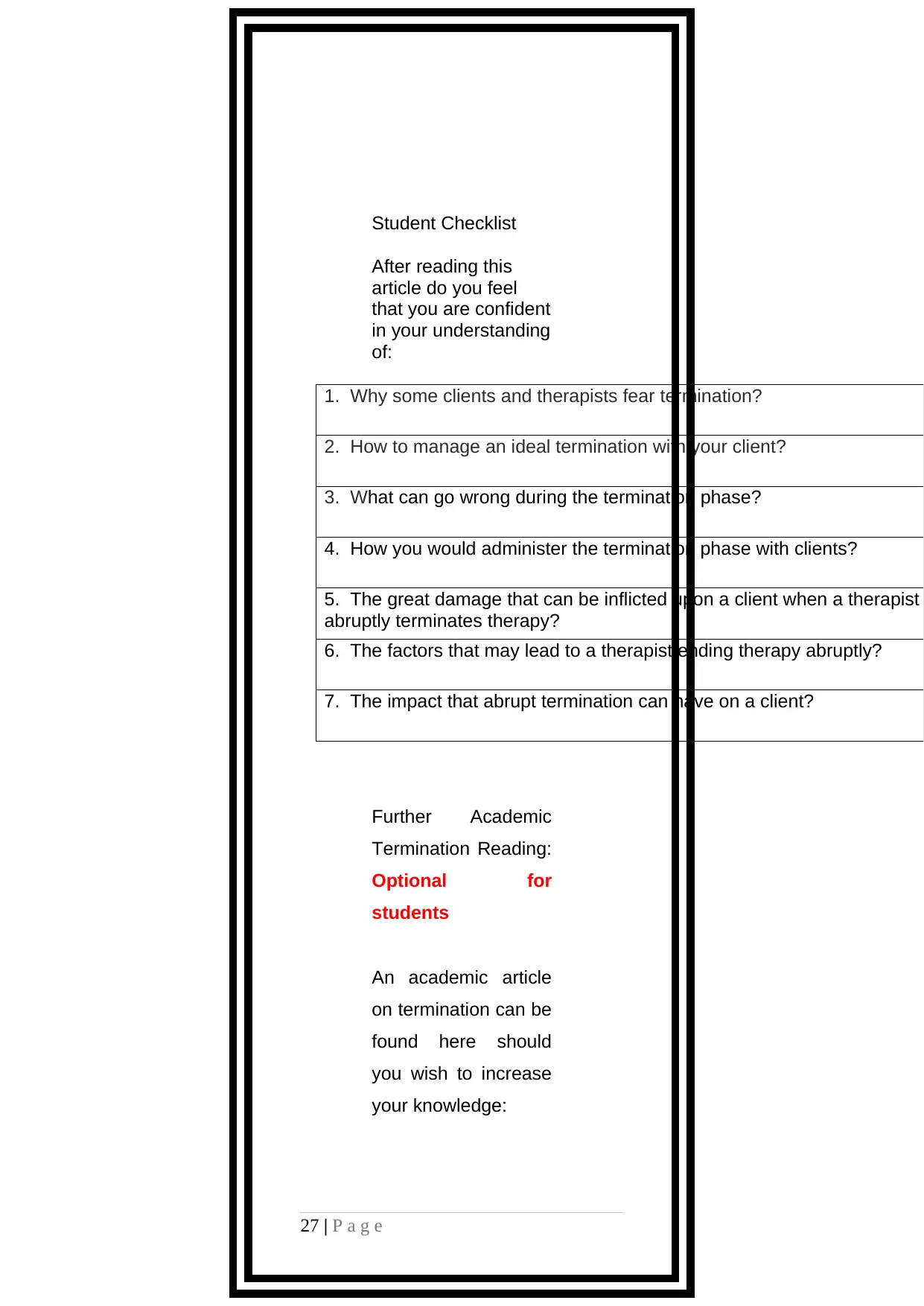
Student Checklist
After reading this
article do you feel
that you are confident
in your understanding
of:
1. Why some clients and therapists fear termination?
2. How to manage an ideal termination with your client?
3. What can go wrong during the termination phase?
4. How you would administer the termination phase with clients?
5. The great damage that can be inflicted upon a client when a therapist
abruptly terminates therapy?
6. The factors that may lead to a therapist ending therapy abruptly?
7. The impact that abrupt termination can have on a client?
Further Academic
Termination Reading:
Optional for
students
An academic article
on termination can be
found here should
you wish to increase
your knowledge:
27 | P a g e
After reading this
article do you feel
that you are confident
in your understanding
of:
1. Why some clients and therapists fear termination?
2. How to manage an ideal termination with your client?
3. What can go wrong during the termination phase?
4. How you would administer the termination phase with clients?
5. The great damage that can be inflicted upon a client when a therapist
abruptly terminates therapy?
6. The factors that may lead to a therapist ending therapy abruptly?
7. The impact that abrupt termination can have on a client?
Further Academic
Termination Reading:
Optional for
students
An academic article
on termination can be
found here should
you wish to increase
your knowledge:
27 | P a g e

‘Parting is such sweet
sorrow;
https://
scholarworks.umt.ed
u/cgi/
viewcontent.cgi?
referer=https://
www.google.co.uk/
&httpsredir=1&article
=10641&context=etd
SECTION 3:
Preparing a client for
termination?
You were introduced
to Kate in workbook
4. Below is an
update on Kates
progress in
counselling. Please
read carefully.
Kate has been
attending counselling
28 | P a g e
sorrow;
https://
scholarworks.umt.ed
u/cgi/
viewcontent.cgi?
referer=https://
www.google.co.uk/
&httpsredir=1&article
=10641&context=etd
SECTION 3:
Preparing a client for
termination?
You were introduced
to Kate in workbook
4. Below is an
update on Kates
progress in
counselling. Please
read carefully.
Kate has been
attending counselling
28 | P a g e
Secure Best Marks with AI Grader
Need help grading? Try our AI Grader for instant feedback on your assignments.
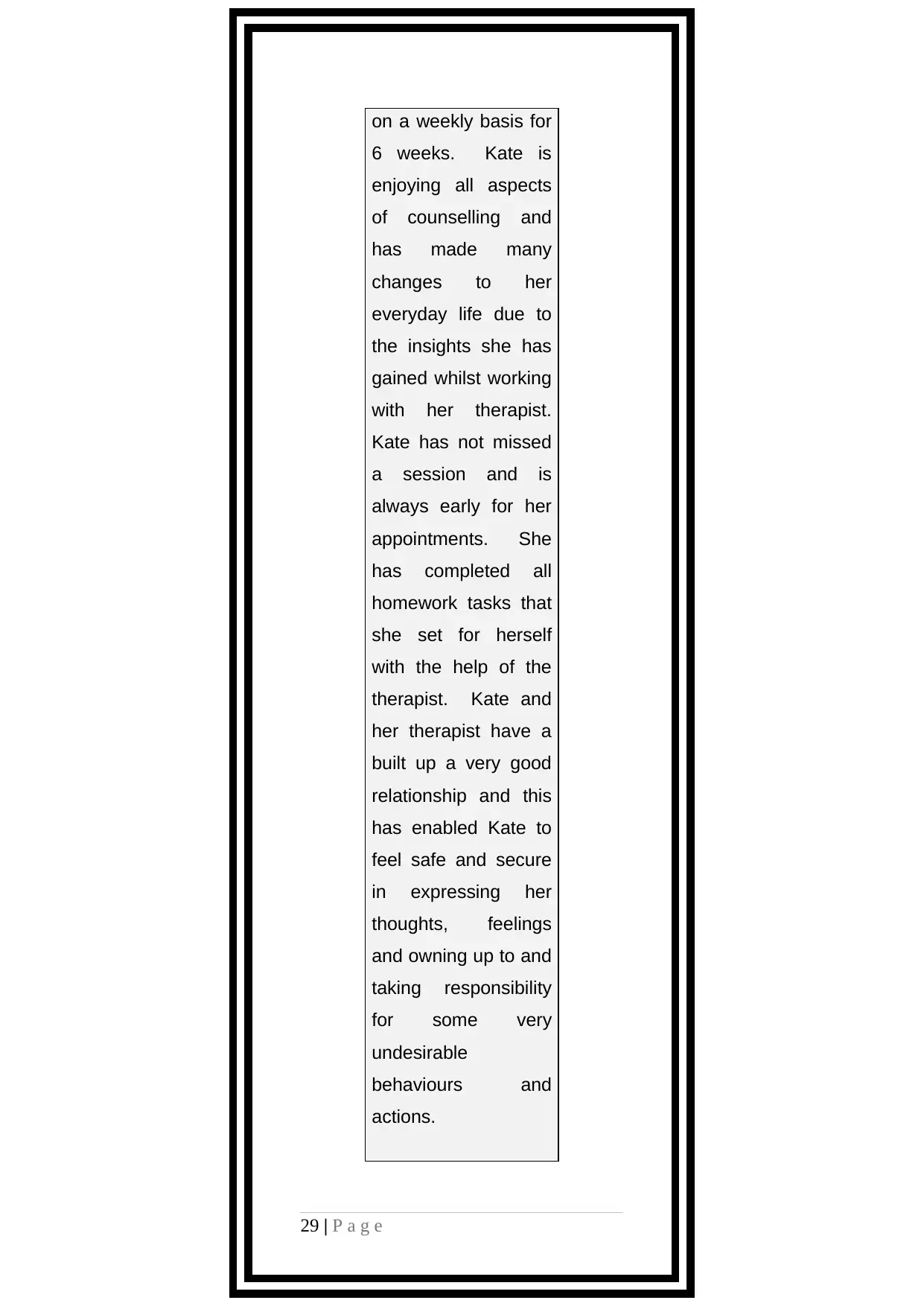
on a weekly basis for
6 weeks. Kate is
enjoying all aspects
of counselling and
has made many
changes to her
everyday life due to
the insights she has
gained whilst working
with her therapist.
Kate has not missed
a session and is
always early for her
appointments. She
has completed all
homework tasks that
she set for herself
with the help of the
therapist. Kate and
her therapist have a
built up a very good
relationship and this
has enabled Kate to
feel safe and secure
in expressing her
thoughts, feelings
and owning up to and
taking responsibility
for some very
undesirable
behaviours and
actions.
29 | P a g e
6 weeks. Kate is
enjoying all aspects
of counselling and
has made many
changes to her
everyday life due to
the insights she has
gained whilst working
with her therapist.
Kate has not missed
a session and is
always early for her
appointments. She
has completed all
homework tasks that
she set for herself
with the help of the
therapist. Kate and
her therapist have a
built up a very good
relationship and this
has enabled Kate to
feel safe and secure
in expressing her
thoughts, feelings
and owning up to and
taking responsibility
for some very
undesirable
behaviours and
actions.
29 | P a g e
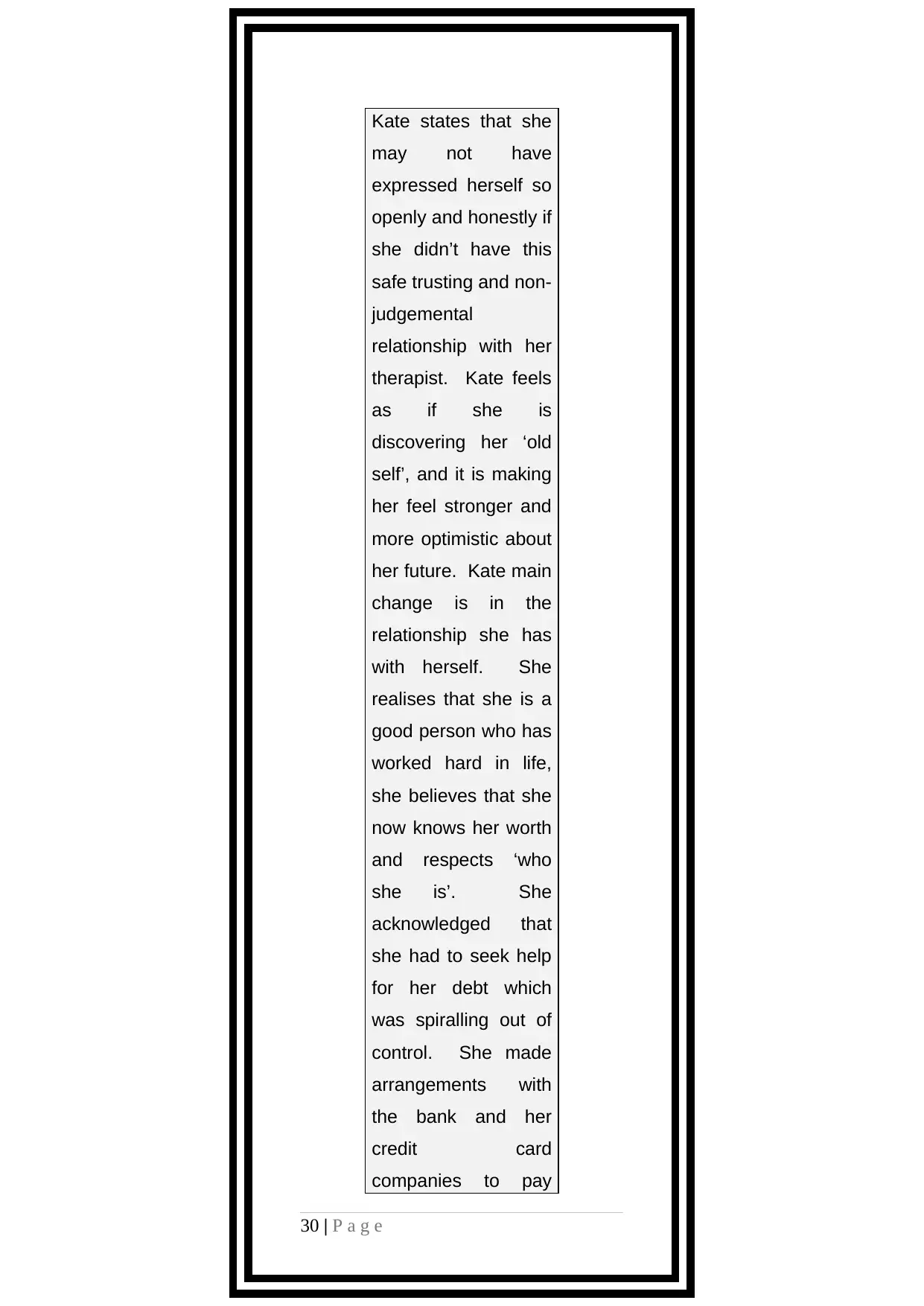
Kate states that she
may not have
expressed herself so
openly and honestly if
she didn’t have this
safe trusting and non-
judgemental
relationship with her
therapist. Kate feels
as if she is
discovering her ‘old
self’, and it is making
her feel stronger and
more optimistic about
her future. Kate main
change is in the
relationship she has
with herself. She
realises that she is a
good person who has
worked hard in life,
she believes that she
now knows her worth
and respects ‘who
she is’. She
acknowledged that
she had to seek help
for her debt which
was spiralling out of
control. She made
arrangements with
the bank and her
credit card
companies to pay
30 | P a g e
may not have
expressed herself so
openly and honestly if
she didn’t have this
safe trusting and non-
judgemental
relationship with her
therapist. Kate feels
as if she is
discovering her ‘old
self’, and it is making
her feel stronger and
more optimistic about
her future. Kate main
change is in the
relationship she has
with herself. She
realises that she is a
good person who has
worked hard in life,
she believes that she
now knows her worth
and respects ‘who
she is’. She
acknowledged that
she had to seek help
for her debt which
was spiralling out of
control. She made
arrangements with
the bank and her
credit card
companies to pay
30 | P a g e
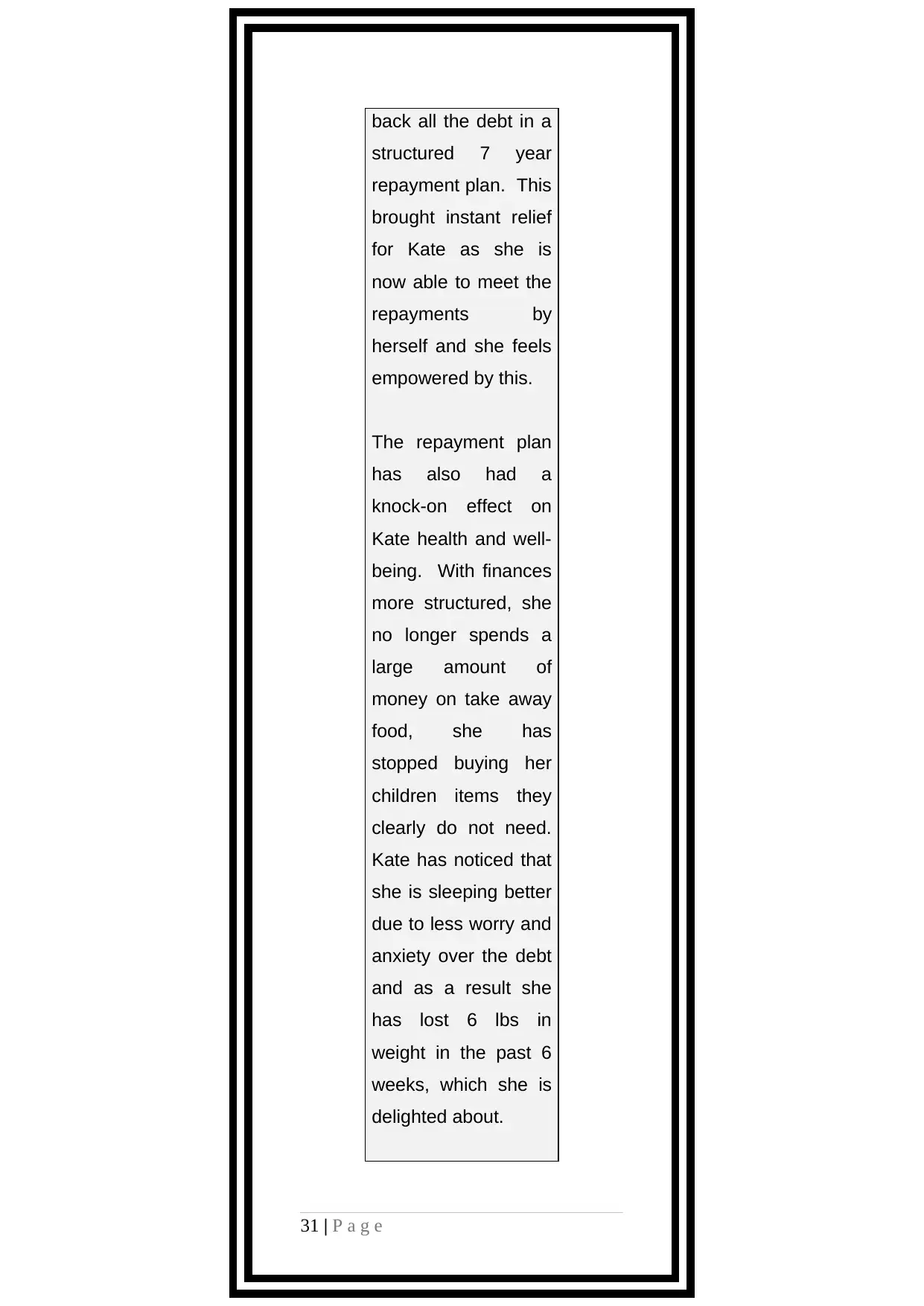
back all the debt in a
structured 7 year
repayment plan. This
brought instant relief
for Kate as she is
now able to meet the
repayments by
herself and she feels
empowered by this.
The repayment plan
has also had a
knock-on effect on
Kate health and well-
being. With finances
more structured, she
no longer spends a
large amount of
money on take away
food, she has
stopped buying her
children items they
clearly do not need.
Kate has noticed that
she is sleeping better
due to less worry and
anxiety over the debt
and as a result she
has lost 6 lbs in
weight in the past 6
weeks, which she is
delighted about.
31 | P a g e
structured 7 year
repayment plan. This
brought instant relief
for Kate as she is
now able to meet the
repayments by
herself and she feels
empowered by this.
The repayment plan
has also had a
knock-on effect on
Kate health and well-
being. With finances
more structured, she
no longer spends a
large amount of
money on take away
food, she has
stopped buying her
children items they
clearly do not need.
Kate has noticed that
she is sleeping better
due to less worry and
anxiety over the debt
and as a result she
has lost 6 lbs in
weight in the past 6
weeks, which she is
delighted about.
31 | P a g e
Paraphrase This Document
Need a fresh take? Get an instant paraphrase of this document with our AI Paraphraser
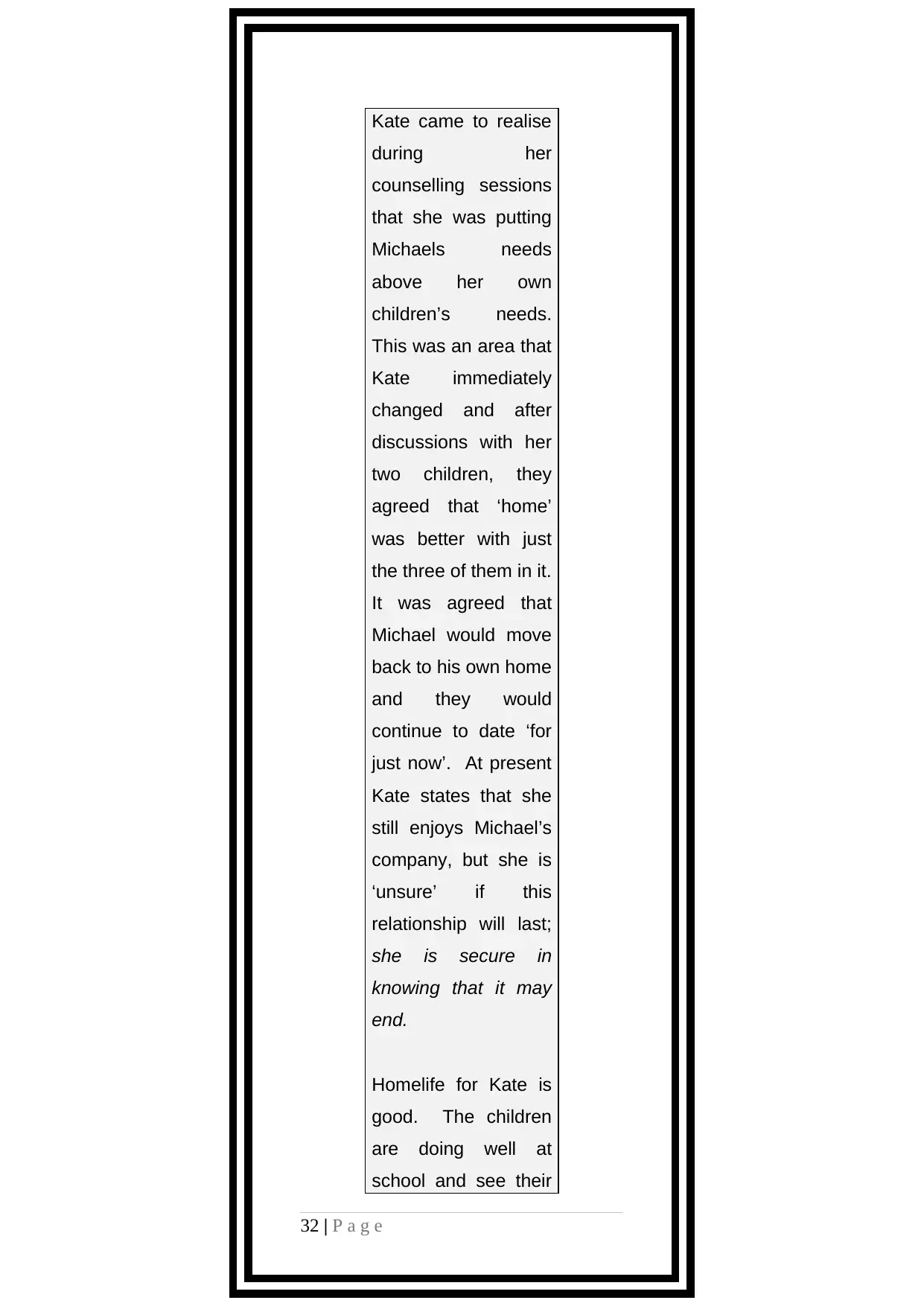
Kate came to realise
during her
counselling sessions
that she was putting
Michaels needs
above her own
children’s needs.
This was an area that
Kate immediately
changed and after
discussions with her
two children, they
agreed that ‘home’
was better with just
the three of them in it.
It was agreed that
Michael would move
back to his own home
and they would
continue to date ‘for
just now’. At present
Kate states that she
still enjoys Michael’s
company, but she is
‘unsure’ if this
relationship will last;
she is secure in
knowing that it may
end.
Homelife for Kate is
good. The children
are doing well at
school and see their
32 | P a g e
during her
counselling sessions
that she was putting
Michaels needs
above her own
children’s needs.
This was an area that
Kate immediately
changed and after
discussions with her
two children, they
agreed that ‘home’
was better with just
the three of them in it.
It was agreed that
Michael would move
back to his own home
and they would
continue to date ‘for
just now’. At present
Kate states that she
still enjoys Michael’s
company, but she is
‘unsure’ if this
relationship will last;
she is secure in
knowing that it may
end.
Homelife for Kate is
good. The children
are doing well at
school and see their
32 | P a g e
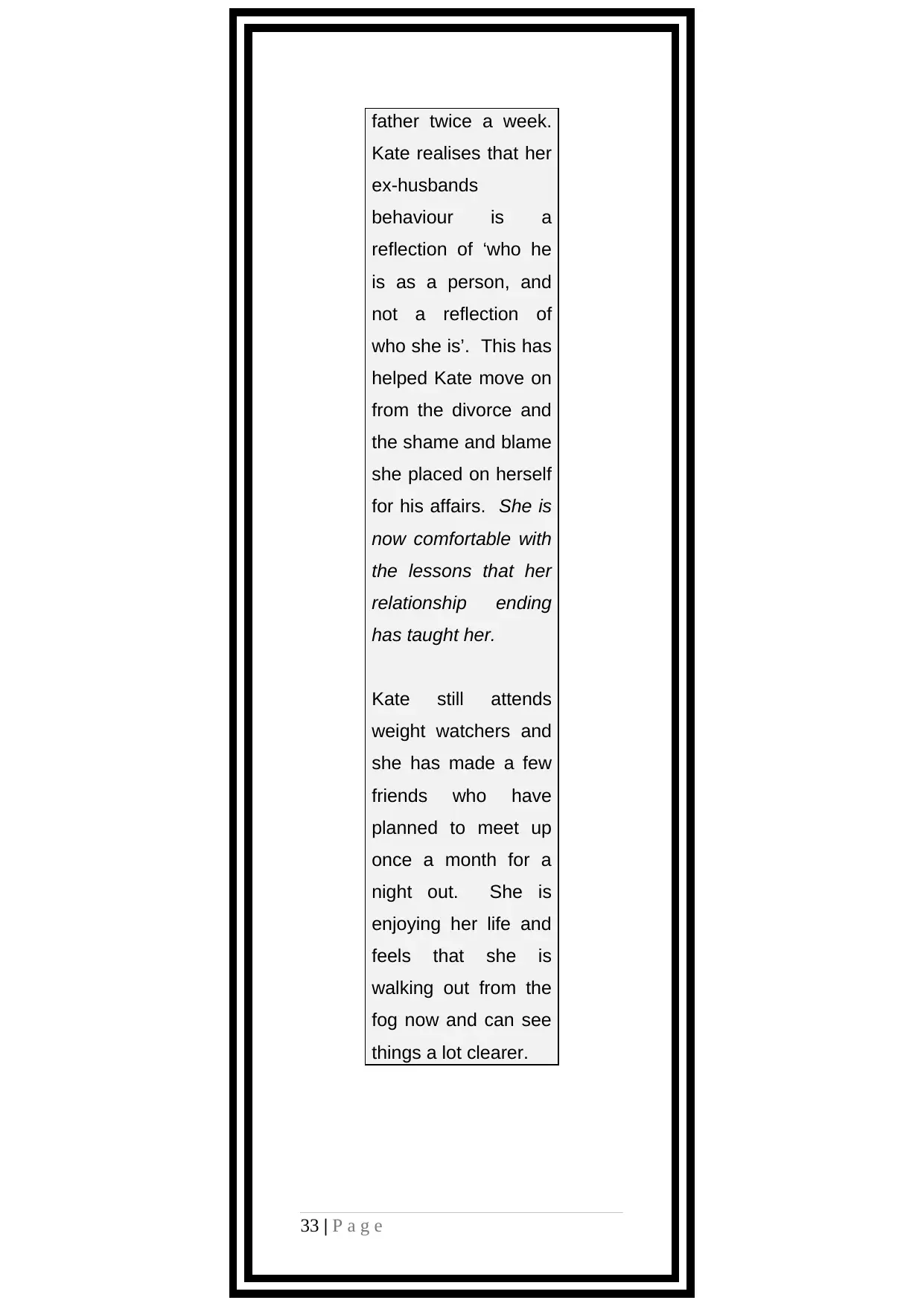
father twice a week.
Kate realises that her
ex-husbands
behaviour is a
reflection of ‘who he
is as a person, and
not a reflection of
who she is’. This has
helped Kate move on
from the divorce and
the shame and blame
she placed on herself
for his affairs. She is
now comfortable with
the lessons that her
relationship ending
has taught her.
Kate still attends
weight watchers and
she has made a few
friends who have
planned to meet up
once a month for a
night out. She is
enjoying her life and
feels that she is
walking out from the
fog now and can see
things a lot clearer.
33 | P a g e
Kate realises that her
ex-husbands
behaviour is a
reflection of ‘who he
is as a person, and
not a reflection of
who she is’. This has
helped Kate move on
from the divorce and
the shame and blame
she placed on herself
for his affairs. She is
now comfortable with
the lessons that her
relationship ending
has taught her.
Kate still attends
weight watchers and
she has made a few
friends who have
planned to meet up
once a month for a
night out. She is
enjoying her life and
feels that she is
walking out from the
fog now and can see
things a lot clearer.
33 | P a g e
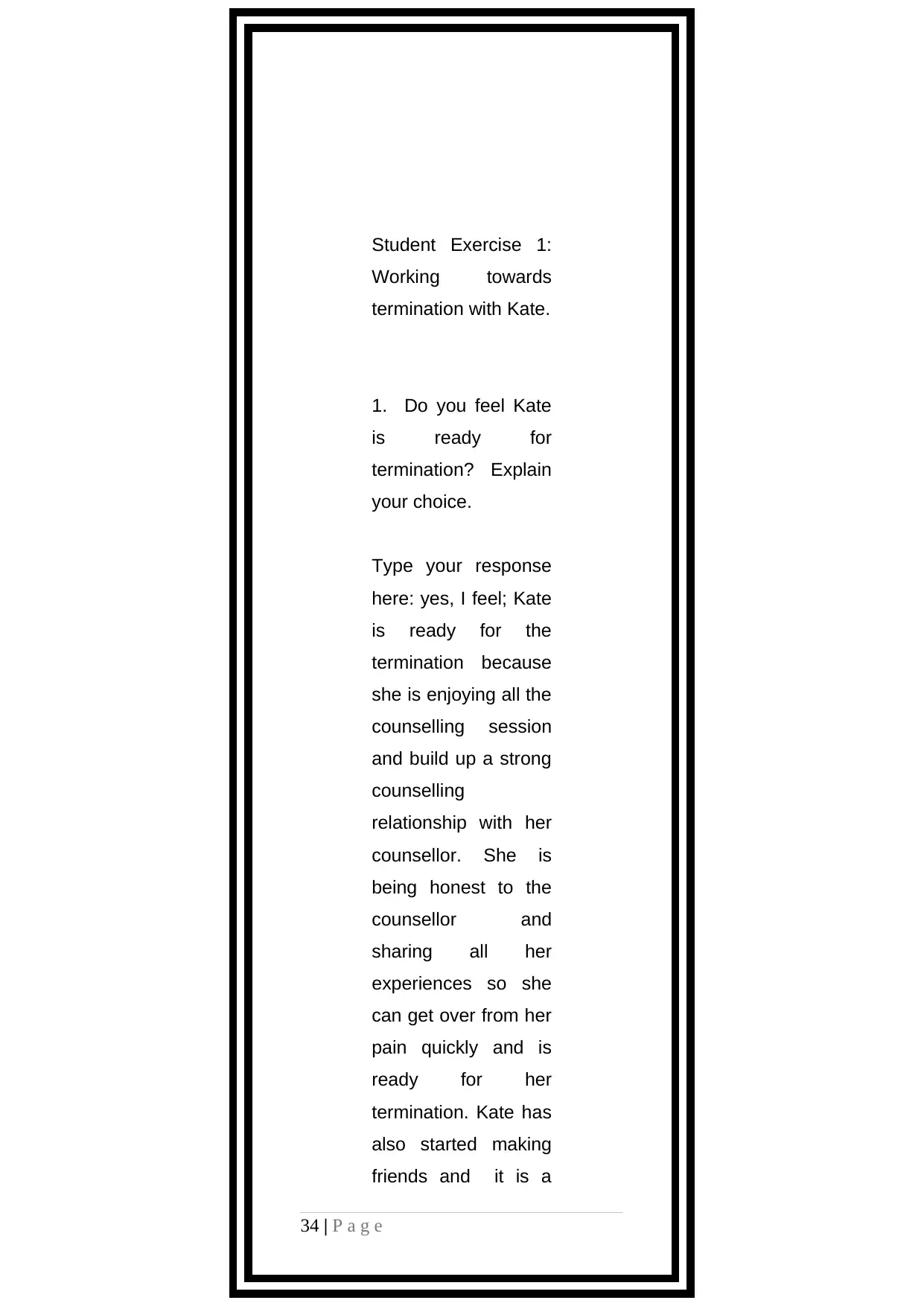
Student Exercise 1:
Working towards
termination with Kate.
1. Do you feel Kate
is ready for
termination? Explain
your choice.
Type your response
here: yes, I feel; Kate
is ready for the
termination because
she is enjoying all the
counselling session
and build up a strong
counselling
relationship with her
counsellor. She is
being honest to the
counsellor and
sharing all her
experiences so she
can get over from her
pain quickly and is
ready for her
termination. Kate has
also started making
friends and it is a
34 | P a g e
Working towards
termination with Kate.
1. Do you feel Kate
is ready for
termination? Explain
your choice.
Type your response
here: yes, I feel; Kate
is ready for the
termination because
she is enjoying all the
counselling session
and build up a strong
counselling
relationship with her
counsellor. She is
being honest to the
counsellor and
sharing all her
experiences so she
can get over from her
pain quickly and is
ready for her
termination. Kate has
also started making
friends and it is a
34 | P a g e
Secure Best Marks with AI Grader
Need help grading? Try our AI Grader for instant feedback on your assignments.
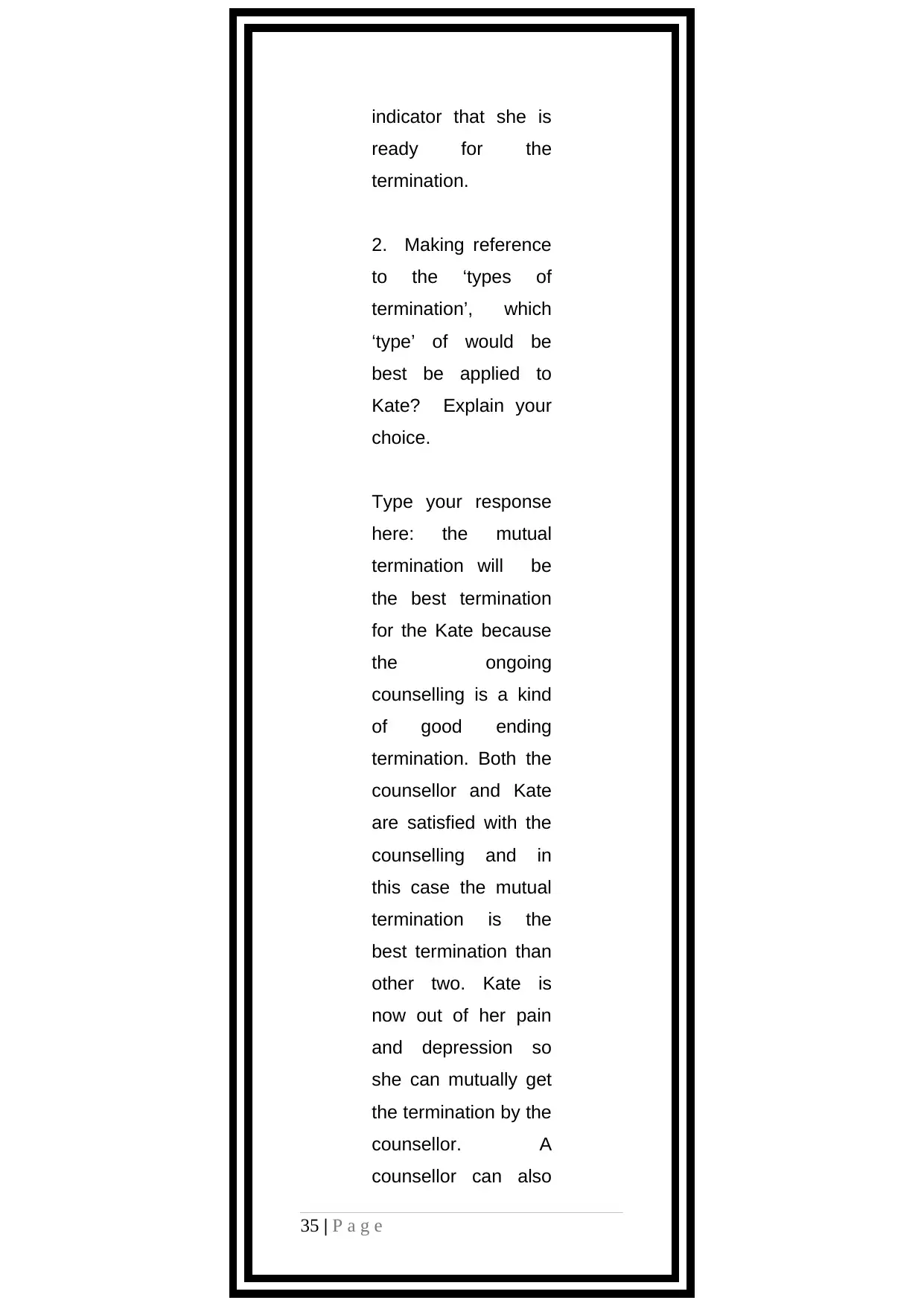
indicator that she is
ready for the
termination.
2. Making reference
to the ‘types of
termination’, which
‘type’ of would be
best be applied to
Kate? Explain your
choice.
Type your response
here: the mutual
termination will be
the best termination
for the Kate because
the ongoing
counselling is a kind
of good ending
termination. Both the
counsellor and Kate
are satisfied with the
counselling and in
this case the mutual
termination is the
best termination than
other two. Kate is
now out of her pain
and depression so
she can mutually get
the termination by the
counsellor. A
counsellor can also
35 | P a g e
ready for the
termination.
2. Making reference
to the ‘types of
termination’, which
‘type’ of would be
best be applied to
Kate? Explain your
choice.
Type your response
here: the mutual
termination will be
the best termination
for the Kate because
the ongoing
counselling is a kind
of good ending
termination. Both the
counsellor and Kate
are satisfied with the
counselling and in
this case the mutual
termination is the
best termination than
other two. Kate is
now out of her pain
and depression so
she can mutually get
the termination by the
counsellor. A
counsellor can also
35 | P a g e
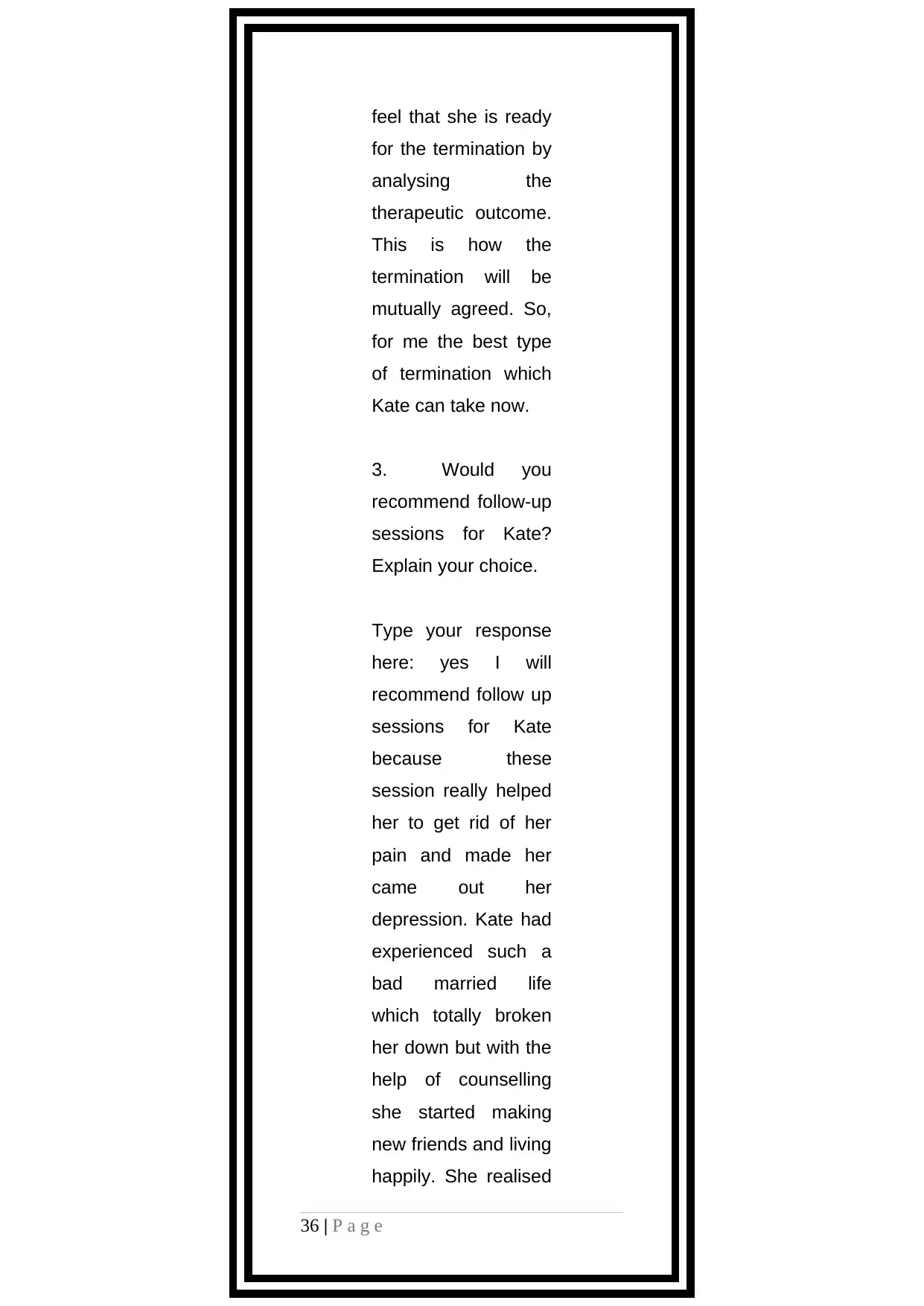
feel that she is ready
for the termination by
analysing the
therapeutic outcome.
This is how the
termination will be
mutually agreed. So,
for me the best type
of termination which
Kate can take now.
3. Would you
recommend follow-up
sessions for Kate?
Explain your choice.
Type your response
here: yes I will
recommend follow up
sessions for Kate
because these
session really helped
her to get rid of her
pain and made her
came out her
depression. Kate had
experienced such a
bad married life
which totally broken
her down but with the
help of counselling
she started making
new friends and living
happily. She realised
36 | P a g e
for the termination by
analysing the
therapeutic outcome.
This is how the
termination will be
mutually agreed. So,
for me the best type
of termination which
Kate can take now.
3. Would you
recommend follow-up
sessions for Kate?
Explain your choice.
Type your response
here: yes I will
recommend follow up
sessions for Kate
because these
session really helped
her to get rid of her
pain and made her
came out her
depression. Kate had
experienced such a
bad married life
which totally broken
her down but with the
help of counselling
she started making
new friends and living
happily. She realised
36 | P a g e
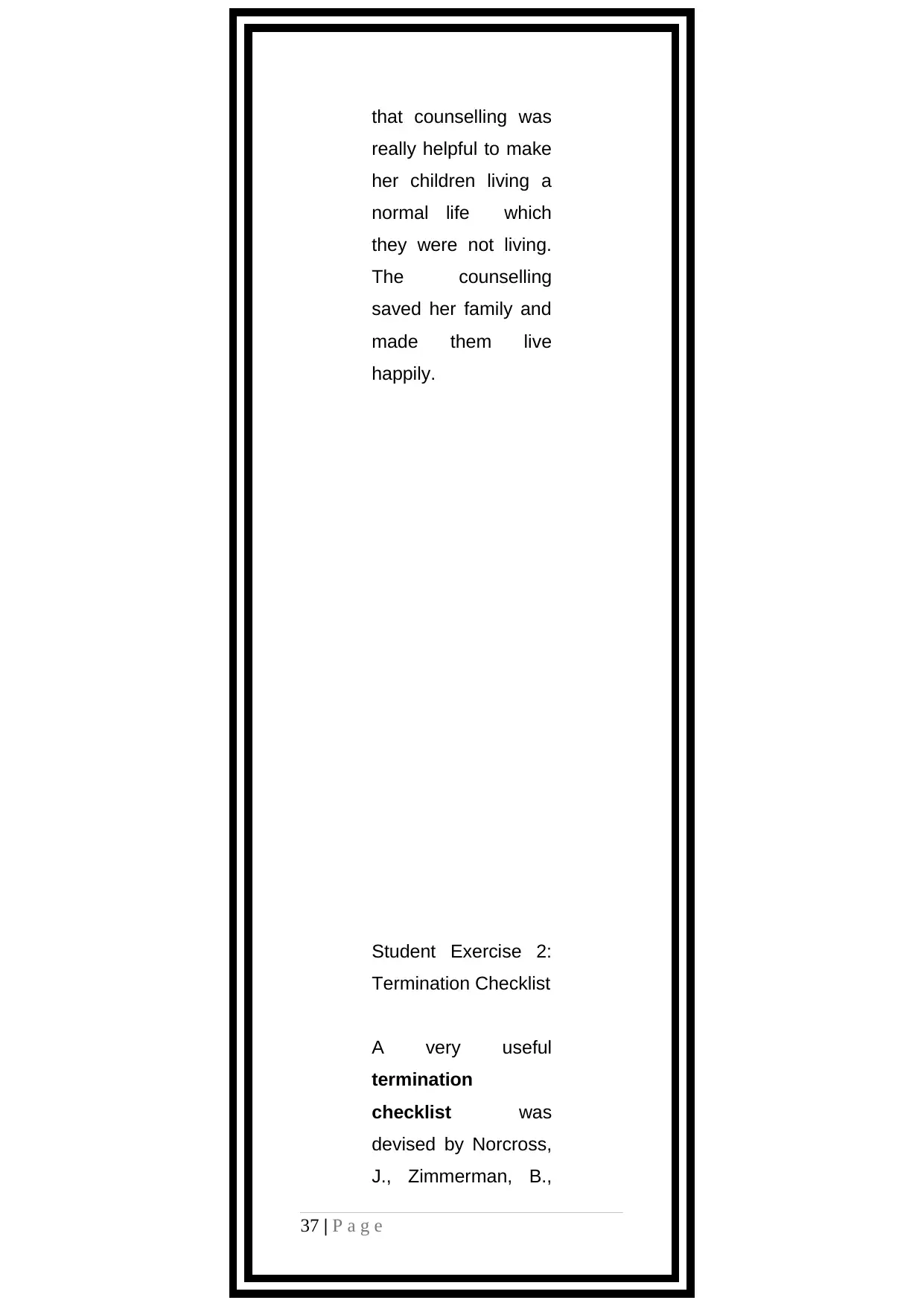
that counselling was
really helpful to make
her children living a
normal life which
they were not living.
The counselling
saved her family and
made them live
happily.
Student Exercise 2:
Termination Checklist
A very useful
termination
checklist was
devised by Norcross,
J., Zimmerman, B.,
37 | P a g e
really helpful to make
her children living a
normal life which
they were not living.
The counselling
saved her family and
made them live
happily.
Student Exercise 2:
Termination Checklist
A very useful
termination
checklist was
devised by Norcross,
J., Zimmerman, B.,
37 | P a g e
Paraphrase This Document
Need a fresh take? Get an instant paraphrase of this document with our AI Paraphraser

Greenberg, R., &
Swift, J. (2017). Do
all therapists do that
when saying
goodbye?
Psychotherapy, 54,
66-75.
The checklist is
available to view
here:
https://
www.scottdmiller.com
/wp-content/
uploads/2017/11/
Termination-
Checklist.pdf
You are now required
to review the
termination checklist
and provide a
termination plan for
Kate. This will
require a clear review
of the updated case
study, along with
some creativity and
imagination from
yourself. Please pay
attention to the
strategy notes
(highlighted in green
38 | P a g e
Swift, J. (2017). Do
all therapists do that
when saying
goodbye?
Psychotherapy, 54,
66-75.
The checklist is
available to view
here:
https://
www.scottdmiller.com
/wp-content/
uploads/2017/11/
Termination-
Checklist.pdf
You are now required
to review the
termination checklist
and provide a
termination plan for
Kate. This will
require a clear review
of the updated case
study, along with
some creativity and
imagination from
yourself. Please pay
attention to the
strategy notes
(highlighted in green
38 | P a g e
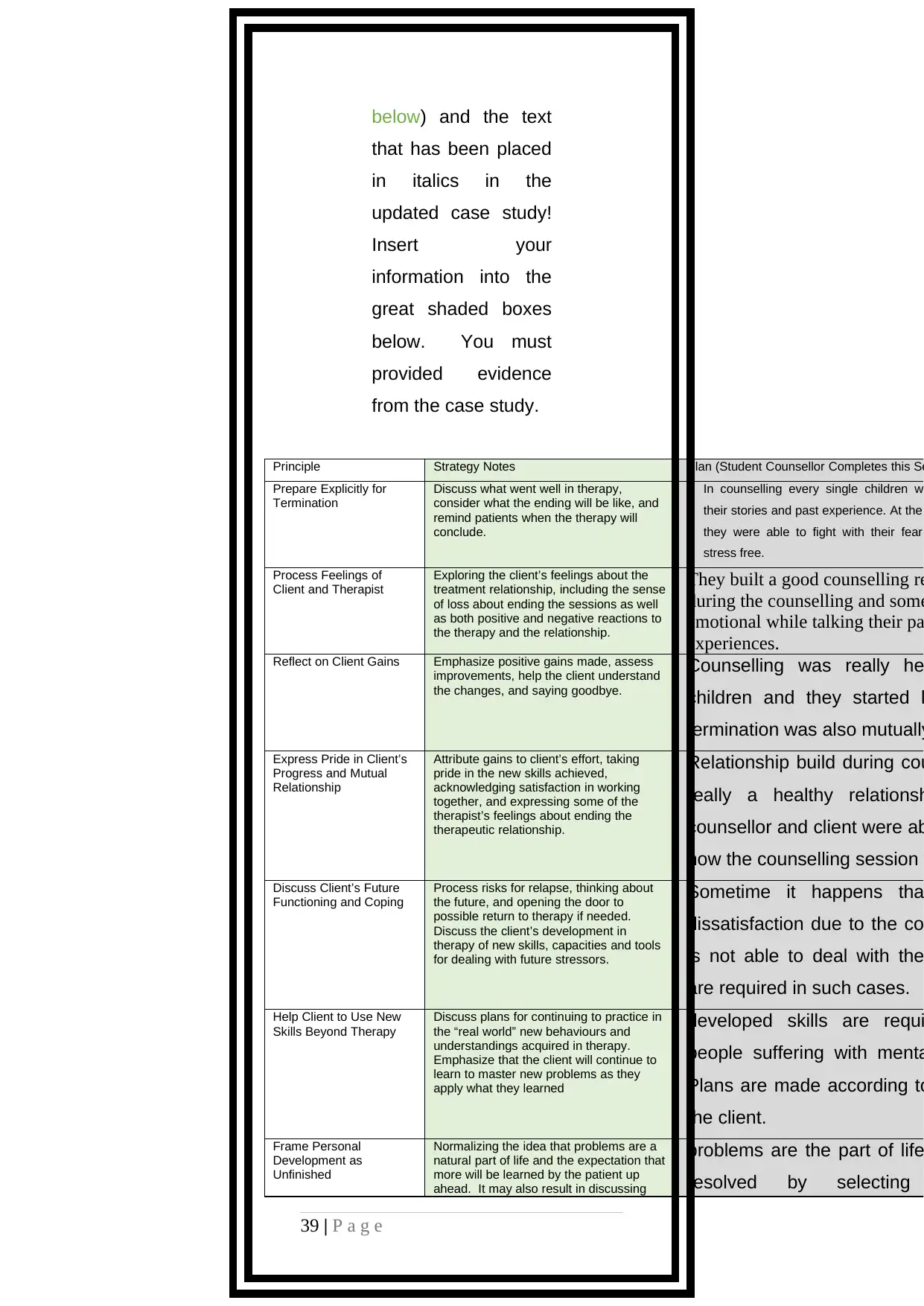
below) and the text
that has been placed
in italics in the
updated case study!
Insert your
information into the
great shaded boxes
below. You must
provided evidence
from the case study.
Principle Strategy Notes Plan (Student Counsellor Completes this Se
Prepare Explicitly for
Termination
Discuss what went well in therapy,
consider what the ending will be like, and
remind patients when the therapy will
conclude.
In counselling every single children w
their stories and past experience. At the
they were able to fight with their fear
stress free.
Process Feelings of
Client and Therapist
Exploring the client’s feelings about the
treatment relationship, including the sense
of loss about ending the sessions as well
as both positive and negative reactions to
the therapy and the relationship.
They built a good counselling re
during the counselling and some
emotional while talking their pa
experiences.
Reflect on Client Gains Emphasize positive gains made, assess
improvements, help the client understand
the changes, and saying goodbye.
Counselling was really he
children and they started l
termination was also mutually
Express Pride in Client’s
Progress and Mutual
Relationship
Attribute gains to client’s effort, taking
pride in the new skills achieved,
acknowledging satisfaction in working
together, and expressing some of the
therapist’s feelings about ending the
therapeutic relationship.
Relationship build during cou
really a healthy relationsh
counsellor and client were ab
how the counselling session
Discuss Client’s Future
Functioning and Coping
Process risks for relapse, thinking about
the future, and opening the door to
possible return to therapy if needed.
Discuss the client’s development in
therapy of new skills, capacities and tools
for dealing with future stressors.
Sometime it happens tha
dissatisfaction due to the co
is not able to deal with the
are required in such cases.
Help Client to Use New
Skills Beyond Therapy
Discuss plans for continuing to practice in
the “real world” new behaviours and
understandings acquired in therapy.
Emphasize that the client will continue to
learn to master new problems as they
apply what they learned
developed skills are requi
people suffering with menta
Plans are made according to
the client.
Frame Personal
Development as
Unfinished
Normalizing the idea that problems are a
natural part of life and the expectation that
more will be learned by the patient up
ahead. It may also result in discussing
problems are the part of life
resolved by selecting
39 | P a g e
that has been placed
in italics in the
updated case study!
Insert your
information into the
great shaded boxes
below. You must
provided evidence
from the case study.
Principle Strategy Notes Plan (Student Counsellor Completes this Se
Prepare Explicitly for
Termination
Discuss what went well in therapy,
consider what the ending will be like, and
remind patients when the therapy will
conclude.
In counselling every single children w
their stories and past experience. At the
they were able to fight with their fear
stress free.
Process Feelings of
Client and Therapist
Exploring the client’s feelings about the
treatment relationship, including the sense
of loss about ending the sessions as well
as both positive and negative reactions to
the therapy and the relationship.
They built a good counselling re
during the counselling and some
emotional while talking their pa
experiences.
Reflect on Client Gains Emphasize positive gains made, assess
improvements, help the client understand
the changes, and saying goodbye.
Counselling was really he
children and they started l
termination was also mutually
Express Pride in Client’s
Progress and Mutual
Relationship
Attribute gains to client’s effort, taking
pride in the new skills achieved,
acknowledging satisfaction in working
together, and expressing some of the
therapist’s feelings about ending the
therapeutic relationship.
Relationship build during cou
really a healthy relationsh
counsellor and client were ab
how the counselling session
Discuss Client’s Future
Functioning and Coping
Process risks for relapse, thinking about
the future, and opening the door to
possible return to therapy if needed.
Discuss the client’s development in
therapy of new skills, capacities and tools
for dealing with future stressors.
Sometime it happens tha
dissatisfaction due to the co
is not able to deal with the
are required in such cases.
Help Client to Use New
Skills Beyond Therapy
Discuss plans for continuing to practice in
the “real world” new behaviours and
understandings acquired in therapy.
Emphasize that the client will continue to
learn to master new problems as they
apply what they learned
developed skills are requi
people suffering with menta
Plans are made according to
the client.
Frame Personal
Development as
Unfinished
Normalizing the idea that problems are a
natural part of life and the expectation that
more will be learned by the patient up
ahead. It may also result in discussing
problems are the part of life
resolved by selecting
39 | P a g e
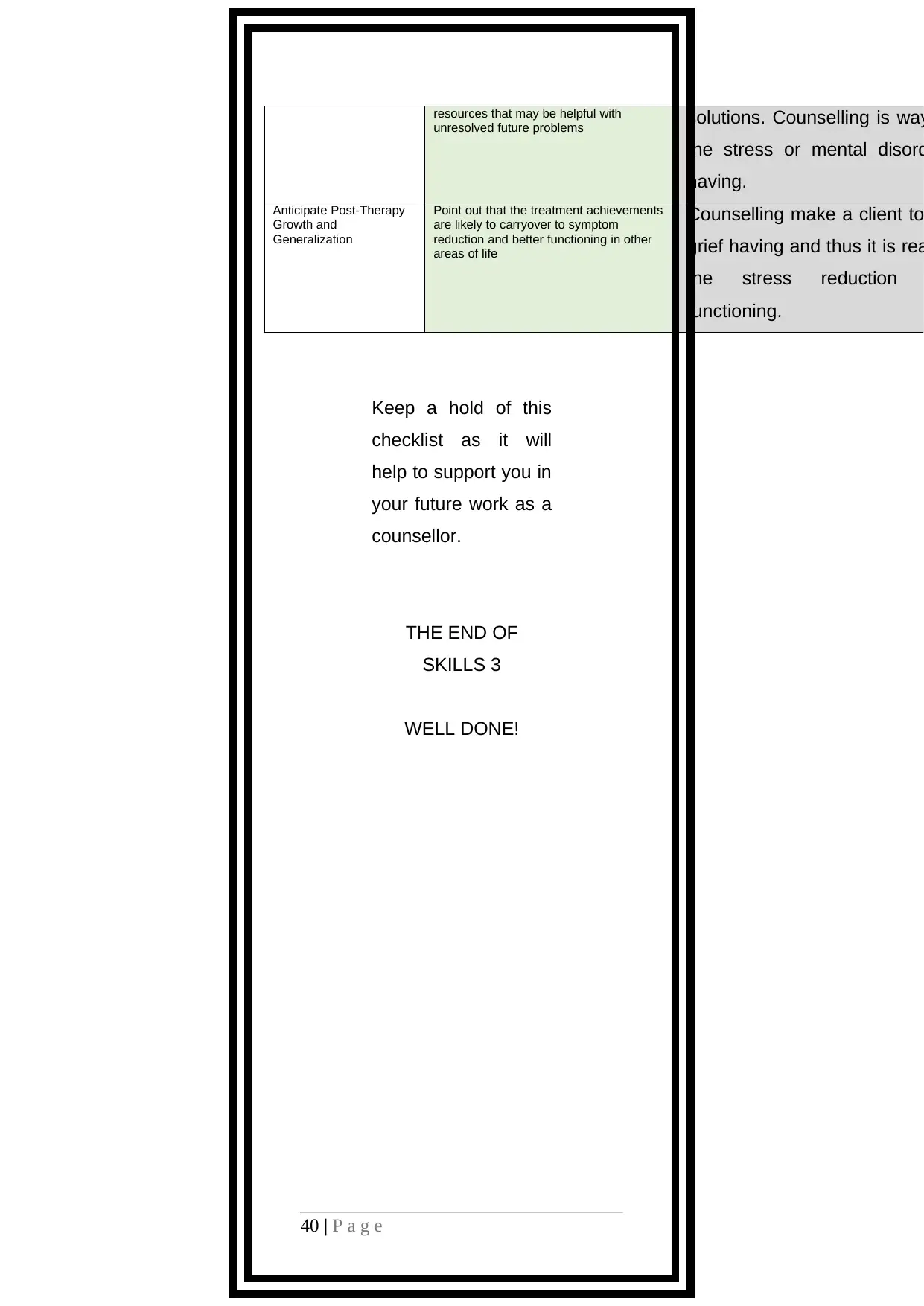
resources that may be helpful with
unresolved future problems solutions. Counselling is way
the stress or mental disord
having.
Anticipate Post-Therapy
Growth and
Generalization
Point out that the treatment achievements
are likely to carryover to symptom
reduction and better functioning in other
areas of life
Counselling make a client to
grief having and thus it is rea
the stress reduction
functioning.
Keep a hold of this
checklist as it will
help to support you in
your future work as a
counsellor.
THE END OF
SKILLS 3
WELL DONE!
40 | P a g e
unresolved future problems solutions. Counselling is way
the stress or mental disord
having.
Anticipate Post-Therapy
Growth and
Generalization
Point out that the treatment achievements
are likely to carryover to symptom
reduction and better functioning in other
areas of life
Counselling make a client to
grief having and thus it is rea
the stress reduction
functioning.
Keep a hold of this
checklist as it will
help to support you in
your future work as a
counsellor.
THE END OF
SKILLS 3
WELL DONE!
40 | P a g e
1 out of 40
Related Documents
Your All-in-One AI-Powered Toolkit for Academic Success.
+13062052269
info@desklib.com
Available 24*7 on WhatsApp / Email
![[object Object]](/_next/static/media/star-bottom.7253800d.svg)
Unlock your academic potential
© 2024 | Zucol Services PVT LTD | All rights reserved.




